Category: Tony Benn
October 11th, 2017 by geoffhodgson1946
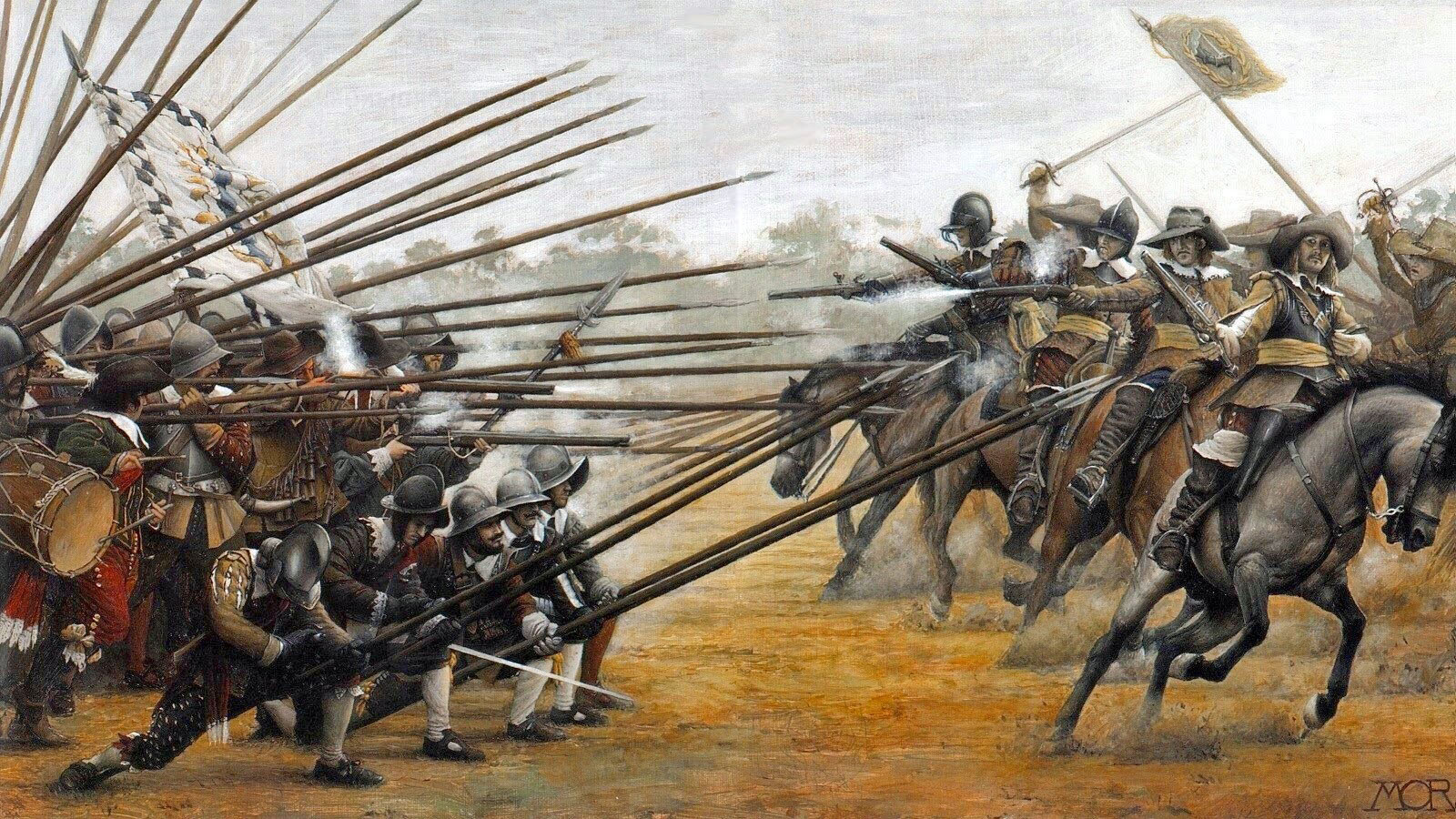
Geoffrey M. Hodgson
If you wish to cultivate an image of being principled and politically pure, then avoidance of policy details, plus a good dose of historical ignorance, can be very useful. You may conjure up figures from past history and recruit them to the cause of your choice.
Perhaps unwittingly, Jeremy Corbyn acquired these methods from his mentor Tony Benn. Their shared cause, or course, is socialism. But its details must be kept vague and the statist pill must be sugared with ample use of the word “democratic”. Not too much thought must be applied to how the “democratic” bit works in practice.
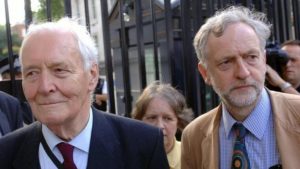
Tony Benn and Jeremy Corbyn
Ignorance of history is an asset. You find some radical heroes who have opposed injustice, inequality, and the status quo. Don’t go into too many details. It might prove embarrassing. Simply suggest that because of their radical energy these radicals must have been, or they were on the way to becoming, “democratic socialists”.
It’s even better if you can go back in history long before there was any movement calling itself socialist – long before the word was invented. Then you can do a bit of hand-waving with phrases like “their ideas were moving towards democratic socialism” or “what would they think today?” with less fear of contradiction.
After all, if they were true and principled radicals, then they must have been moving in that direction. Socialism is obvious. Isn’t it?
The English Civil War
The English Civil War of the 1640s is a good hunting ground for your heroes. In a book published in 1980, the veteran Labour Party MP Fenner Brockway declared the seventeenth-century Levellers and Diggers as Britain’s First Socialists. His friend Tony Benn had already located them there. Jeremy Corbyn followed their cue.
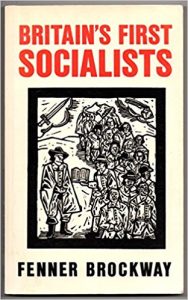
The English Civil War erupted in 1642, as a conflict of authority between the King and Parliament. King Charles I claimed to rule by divine right, deriving his sovereignty from religion. By contrast, Parliament professed to represent the will of the people. But only a small minority of males had the right to vote in parliamentary elections. Women had no vote.
 Parliamentarians and Royalists warred throughout Britain until the defeat and execution of Charles I in 1649 and the installation of a republic under Oliver Cromwell.
Parliamentarians and Royalists warred throughout Britain until the defeat and execution of Charles I in 1649 and the installation of a republic under Oliver Cromwell.
The Civil War stimulated seminal debates concerning power and authority. There was a growth of dissident Protestant groups, who saw the established Protestant Church of England as too hierarchical and conservative.
These widening schisms forced the question of the legitimation of government authority onto the immediate agenda.
Political ideas of the Levellers
Prompted by debates over what to do with the monarchy and the King after his defeat, a major political movement developed within the Parliamentarian army. They were called Levellers.
 Participants in the earlier anti-enclosure uprising in the Midlands in 1607 had been called “levellers” because they levelled hedges and fences.
Participants in the earlier anti-enclosure uprising in the Midlands in 1607 had been called “levellers” because they levelled hedges and fences.
The Levellers of the 1640s were given this nickname by their enemies, and they repeatedly repudiated the description. They often protested that they were not promoting the “levelling” of landed estates or any general redistribution of property.
The Levellers emphasized popular sovereignty, an extended male franchise, equality before the law, and religious tolerance. They believed in natural and inalienable rights, bestowed by God.
The inalienability of these rights put limits on the powers of any majority in Parliament, because democracy cannot stifle inalienable rights. But otherwise they were strong supporters of democracy.
While they defended private property, they railed against undemocratic tyranny. Hence their position was different from some modern libertarians who, while generally supporting liberty, argued on occasions that if private property rights were threatened, then democracy might justifiably be replaced by temporary dictatorship.
From 1647 to 1649 the Levellers published a series of manifestos entitled The Agreement of the People. The Levellers were the first political movement in Europe to call for the separation of church and state and for a secular republic.
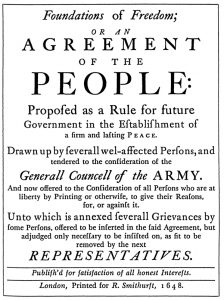 Authority would be vested in the House of Commons rather than in the King or the House of Lords. Specified “native rights” were declared sacrosanct for all Englishmen: freedom of conscience, freedom of worship, freedom from impressment into the armed forces, and equality before the law.
Authority would be vested in the House of Commons rather than in the King or the House of Lords. Specified “native rights” were declared sacrosanct for all Englishmen: freedom of conscience, freedom of worship, freedom from impressment into the armed forces, and equality before the law.
The Levellers argued for a constitution based upon an extended manhood suffrage and biennial Parliaments. But they did not advocate female suffrage. And as C. B. Macpherson noted:
“the Levellers consistently excluded from their franchise proposals two substantial categories of men, namely, servants or wage-earners, and those in receipt of alms or beggars.”
Oliver Cromwell and the Levellers
The Levellers were influential in Cromwell’s army. At a rendezvous near Ware in Hertfordshire on 15 November 1647, two regiments carried copies of the Agreement of the People and stuck pieces of paper in their hat-bands with the Leveller slogan “England’s Freedom, Soldiers’ Rights”.
With swords drawn, Cromwell and some of his officers rode into their ranks and ordered them to take the papers from their hats. One of the soldiers was swiftly executed for mutiny.
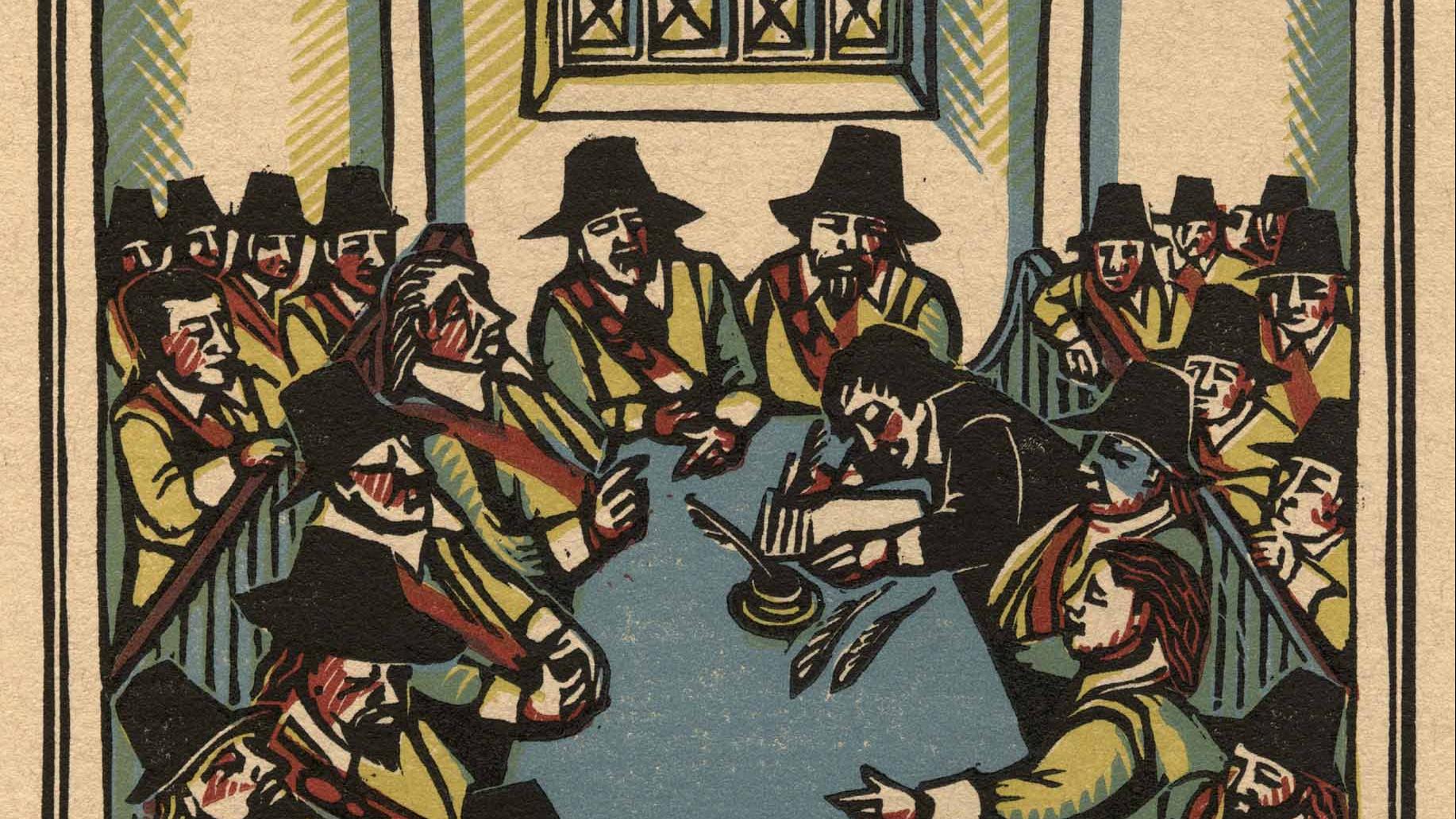
Putney Debates 1647
Siding with the Levellers in the Putney Debates of 1647, the parliamentarian Colonel Thomas Rainsborough argued that both the rich and poor had a right to a decent life, and that “every man that is to live under a government ought first by his own consent to put himself under that government”.
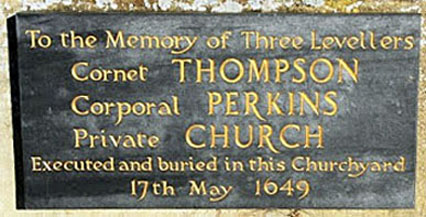
Burford Churchyard Memorial
But in 1649, Rainsborough was killed, Leveller-led army mutinies in London and Oxfordshire were crushed, and Cromwell effectively destroyed the Levellers as a political force.
John Lilburne
John Lilburne, the Leveller leader, came from County Durham. He was originally a Puritan and he later converted to Quakerism. Arrested in 1637 for circulating unlicensed pamphlets, he was fined £500, whipped, pilloried, and imprisoned.
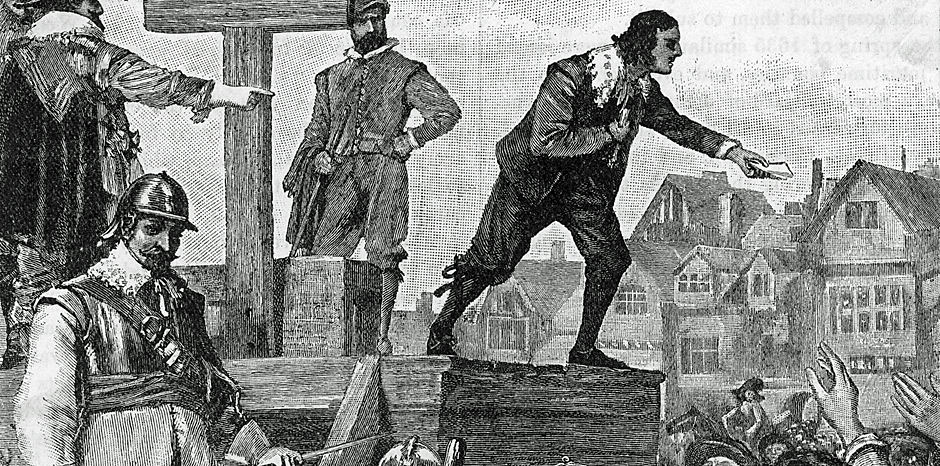
John Lilburne
During the Civil War, Lilburne served as an officer in the Parliamentarian army. For his agitation against the Cromwellian authorities he spent several more years in prison.
Lilburne coined the term “freeborn rights”, defining them as rights with which every human being is born, as opposed to rights bestowed by government or by its laws. He advocated an extended male suffrage, equality under the law and religious tolerance.
Asked in a 2015 interview with the New Statesman to identify the historical figure he most admired, Corbyn named John Lilburne. In a talk in the same month, Corbyn wrongly hinted that Lilburne was a socialist. In fact, Lilburne was a liberal, although that political term was not in use at the time.
Lilburne explained in 1647 that the term “Leveller” applied to him and his party, only in the sense of equality under the law, namely their “desire that all alike may be levelled to, and bound by the Law”.
But much later their socialist admirers assumed that they wished to “level” all property as well. There is no basis for this supposition in Leveller writings.
The Levellers and common ownership
The Levellers declared that rights to liberty and property were innate to every person. Individuals had rights over their thoughts and bodies, without molestation or coercion, and everyone had the natural right to own private property. The Levellers did not promote common ownership, except when it resulted from the voluntary pooling of the property of everyone involved.
Generally the Leveller leaders did not campaign against the enclosure of common lands. Instead they upheld legally-acquired rights of property. The Marxist historian Christopher Hill pointed out that the Levellers “sharply differentiated themselves from the Diggers who advocated a communist programme”.
A defence of private property and a rebuttal of “levelling” appears in the final, May 1649 version of the Leveller Agreement of the People, in a passage addressed to Members of Parliament:
“We therefore agree and declare, That it shall not be in the power of any Representative … [to] level men’s Estates, destroy Propriety, or make all things Common.”
Even if representatives in the legislature were democratically elected, they did not have the right to overturn individual rights to property.
Lilburne’s arguments against common ownership
Likewise, Lilburne was repeatedly obliged to rebut the charge that the Levellers desired to “level” all property. He wrote in 1652:
“In my opinion and judgment, this Conceit of Levelling of property … is so ridiculous and foolish an opinion, as no man of brains, reason, or ingenuity, can be imagined such a sot as to maintain such a principle, because it would, if practised destroy not only any industry in the world, but raze the very foundation of generation, and of subsistence or being of one man by another.”
Lilburne then explained why this was so:
“For as industry and valour by which the societies of mankind are maintained and preserved, who will take the pains for that which when he hath gotten is not his own, but must be equally shared in, by every lazy, simple, dronish sot? Or who will fight for that, wherein he hath no interest, but such as must be subject to the will and pleasure of another, yea of every coward and base low-spirited fellow, that in his sitting still must share in common with a valiant man in all his brave noble achievement?”
Lilburne concluded:
“… those men in England, that are most branded with the name of Levellers, are of all in that Nation, most free from any design of Levelling, in the sense we have spoken of.”
As well as rebutting the charge of “levelling”, Lilburne here defended the institution of private property in terms of its incentives for “industry” and maintaining “subsistence”. If everything were “equally shared”, then the “lazy” would benefit as much as those “who will take the pains”, thus diminishing incentives for individual effort. Incentives to work hard would be lessened.
 The 1/n problem
The 1/n problem
With the above words, Lilburne pointed to the crucial problem of scale in all communistic ventures.
It is a version of what economists call “the free-rider problem”. As the size of the community increases, the free-rider problem can be exacerbated. If the number of people in a working community that shares its income is n, then individual incentives to contribute to community output are very roughly in proportion to 1/n.
As n increases, the extra effort of any single individual is rewarded less, because the output from extra effort is shared between n people. We may call this the 1/n problem. As far as I am aware, Lilburne was the first person to identify it.
Crucially, at low values of n, such as in a family or in a small cooperative, incentives to work hard can be enhanced by face-to-face mechanisms involving reciprocity, trust, commendation, satisfaction, shame, scorn or punishment.
These social mechanisms are effective because they have evolved in human tribes over millions of years. Elinor Ostrom’s case studies of the community management of common pool resources show what is feasible in more recent settings.

Elinor Ostrom
Hence some form of socialism may work on a small scale. But at higher levels of n these interpersonal mechanisms become relatively less effective. Other incentives, involving money and property, are required.
The Levellers on free trade and (state) monopolies
The Levellers advocated free trade. For them, the basic division in society was not between workers and owners of property: it was between the rich and influential – who profited from (state and other) monopolies and government favours – and the rest of the people. A clause in the May 1649 version of The Agreement of the People tells Parliament:
“That it shall not be in their power to continue or make any Laws to abridge or hinder any person or persons, from trading or merchandizing into any place beyond the Seas, where any of this Nation are free to trade.”
Leveller leaders Lilburne, Richard Overton and William Walwyn attributed the existence of low wages to monopolies, restrictions on trade, and excise taxes.
In 1652 Walwyn presented to the Parliamentary Committee for Trade and Foreign Affairs a defence of free trade against the Levant Company, urging the abolition of monopolies and trade restrictions. Walwyn saw free trade as a common right, conducive to common good.
The Levellers and Diggers contrasted
Yet the myth that the Levellers promoted common ownership persists. Tony Benn often mentioned the Levellers favourably, but he ignored their strong commitment to private ownership, and instead suggested that their arguments pointed to “common ownership and a classless society”.
 An entertaining four-part television series set during the English Civil War entitled The Devil’s Whore (released in North America as The Devil’s Mistress) has Rainsborough speaking in favour of common ownership, without any objection from Lilburne.
An entertaining four-part television series set during the English Civil War entitled The Devil’s Whore (released in North America as The Devil’s Mistress) has Rainsborough speaking in favour of common ownership, without any objection from Lilburne.
There is no historical evidence to sustain such depictions. They are fantasies promoted by Benn, Brockway, Corbyn and others.
By contrast, the Diggers opposed private property. From 1649-1650 groups of Diggers squatted on several stretches of common land in southern England. They set up communes whose members worked together on the soil and shared its produce. The Digger leader Gerrard Winstanley published a series of pamphlets advocating common ownership of land.
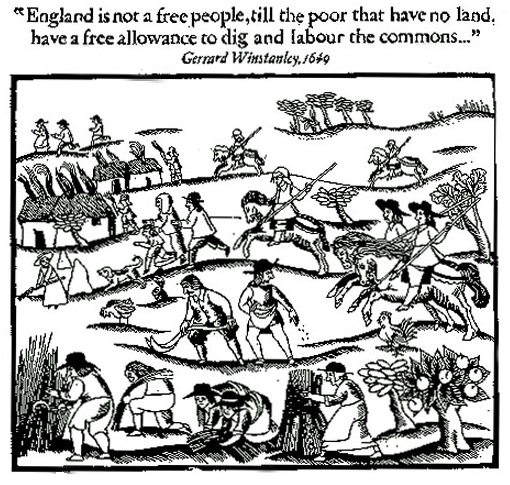
The Diggers
Winstanley regarded the institution of property as a limitation of the freedom of others. Land was bestowed to all by God. Unlike the Levellers, Winstanley criticized trade, because it led to cheating and discontent. He envisioned an agrarian society, in which all goods would be communally owned, and all commerce and wage labour would be outlawed.
Hence the Levellers and Diggers had very different ideological positions. The Levellers advocated individual autonomy, private ownership and free trade. Although they appealed to religion, they saw democratic legitimation as the source of government authority. By contrast, the Diggers proposed a rigid, small-scale, religiously-inspired, agrarian communism.
Conclusion
The Levellers were political theorists as well as activists. They helped to develop the intellectual foundations of Enlightenment liberalism.
Unlike later liberals such as Thomas Paine, they did not advocate a welfare state. Unlike John Stuart Mill they did not call for female suffrage. Unlike twentieth century liberals such as John A. Hobson, John Maynard Keynes and William Beveridge they did not advocate substantial state regulation in a mixed capitalist economy.
But the Levellers were liberals and democrats nevertheless. Their arguments against large-scale socialism remain pertinent today.
11 October 2017
This book elaborates on some of the political issues raised in this blog:

Published by University of Chicago Press in January 2018
Bibliography
Benn, Tony (1976) ‘What would the Levellers do Today?’ 15 May. https://seagreensociety.wordpress.com/tag/levellers-day/.
Brailsford, H. N. (1961) The Levellers and the English Revolution (London: Cresset Press).
Brockway, Fenner (1980) Britain’s First Socialists: The Levellers, Agitators and Diggers of the English Revolution (London: Quartet).
Hampton, Christopher (ed.) (1984) A Radical Reader: The Struggle for Change in England, 1381-1914 (Harmondsworth: Penguin).
Hill, Christopher (1975) The World Turned Upside Down: Radical Ideas During the English Revolution (Harmondsworth: Penguin).
Hodgson, Geoffrey M. (2017) Wrong Turnings: How the Left Got Lost (Chicago: University of Chicago Press, forthcoming).
Macpherson, Crawford B. (1962) The Political Theory of Possessive Individualism: Hobbes to Locke (Oxford: Oxford University Press).
Manning, Brian (1976) The English People and the English Revolution, 1640-1649 (London: Heinemann).
Morton, A. L. (1975) Freedom in Arms: A Selection of Leveller Writings (London: Lawrence and Wishart).
Ostrom, Elinor (1990) Governing the Commons: The Evolution of Institutions for Collective Action (Cambridge: Cambridge University Press).
Otteson, James R. (ed.) (2003) The Levellers: Overton, Walwyn and Lilburne – Works by these and by other British Levellers (Bristol: Thoemme Press).
Robertson, D. B. (1951) The Religious Foundations of Leveller Democracy (New York: Kings Crown Press, Columbia University).
Woodhouse, A. S. P. (ed.) (1951) Puritanism and Liberty: Being the Army Debates of 1647-9 (Chicago: University of Chicago Press).
Posted in Common ownership, Democracy, Jeremy Corbyn, Left politics, Liberalism, Socialism, Tony Benn
October 1st, 2017 by geoffhodgson1946
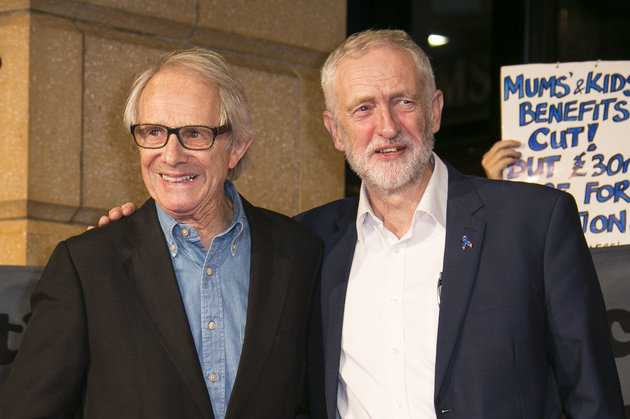
Geoffrey M. Hodgson
Ken Loach was a prominent celebrity at the 2017 Labour Party conference, being photographed in the main conference hall and elsewhere in close proximity to Jeremy Corbyn. But it seems that Loach was not then a member of the Labour Party. Instead he was a recent founder of a rival political party – Left Unity – which was set up to oppose Labour.
This is not a personal attack on Loach. Generally, he is a dignified and caring person. He is entitled to his views, but they are dogmatic and impractical. The question is why Labour now welcomes with open arms a member of a rival political party, with views far more extreme than those that Labour has traditionally professed.
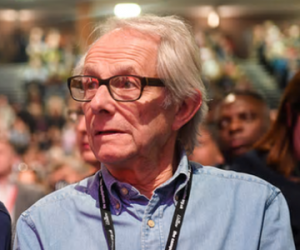 What does Loach’s invitation tell us about the state of the Labour Party today? We need to look at his political views. We need to understand the politics of a celebrity that Labour now chooses to put on public display.
What does Loach’s invitation tell us about the state of the Labour Party today? We need to look at his political views. We need to understand the politics of a celebrity that Labour now chooses to put on public display.
Ken Loach’s contributions to film and to public debate
Loach is a brilliant film director and his work has rightly received global recognition. Two of his films received the Palme d’Or at the Cannes Film Festival. He has also received BAFTA awards.
His best work shows us in moving, dramatic detail how working class people can be trapped by the system, suffering poverty and the tragic loss of their human potential. Such were the personal and emotional stories in Cathy Come Home (1966), Poor Cow (1967), Kes (1969), Raining Stones (1993) I, Daniel Blake (2016) and other great films. Loach, with his gritty, realist style has awakened and re-awakened us over decades to the shamefully enduring problems of poverty, inequality, discrimination and exploitation.
 Other projects by Loach are different in style. He was to direct Jim Allen’s controversial stage play, Perdition. Allen was a Trotskyist and a close friend of Loach, until his death in 1999. Presented as a courtroom drama, the play dealt with an allegation of collaboration between Hungarian Zionists and the Nazis during the Holocaust. This allegation has been strongly contested by historians.
Other projects by Loach are different in style. He was to direct Jim Allen’s controversial stage play, Perdition. Allen was a Trotskyist and a close friend of Loach, until his death in 1999. Presented as a courtroom drama, the play dealt with an allegation of collaboration between Hungarian Zionists and the Nazis during the Holocaust. This allegation has been strongly contested by historians.
The play was due to open at the Royal Court Theatre in January 1987, but it was cancelled 36 hours before the opening night. This same claim of Zionist-Nazi collaboration, citing the same contested sources, was repeated more recently by Ken Livingstone and it led to his suspension from the Labour Party.
From gritty realism to unrealistic politics
In contrast to the gritty realism of his working class dramas, Loach takes a less realistic line when it comes to history.
For example, Land and Freedom (1995) is set in the Spanish Civil War. The script was written by Allen. Scenes in Land and Freedom depict an ideological battle within the Republican camp. The Communist Party opposes others on the left, including anarchists and revolutionary socialists.
Against the Communist Party, Allen and Loach took the side of the revolutionary socialists calling for a socialist revolution and for the seizure of the land by the peasants. This unrealistic ultra-leftism mars the film. It brushes aside the argument that General Franco’s insurrectionary fascism would have been best fought by the broadest possible popular front, from liberals to communists.
 A similar unrealism appears in The Wind That Shakes the Barley (2006). The script was written by Paul Laverty. The film is set in Ireland in the period 1919-1923. It depicts the struggle for independence and the subsequent civil war.
A similar unrealism appears in The Wind That Shakes the Barley (2006). The script was written by Paul Laverty. The film is set in Ireland in the period 1919-1923. It depicts the struggle for independence and the subsequent civil war.
Again there is a sequence where key characters discuss their strategic options. Again full-blooded socialism is mooted as the only way of liberating the country, from poverty and from British tyranny.
But a socialist revolution in Ireland in 1919-23 was even less likely than one in the 1930s in Spain. Ireland was a country of small tenant farmers. It had little urban concentration or industrial development. The small urban working class was not as well organised as in Britain. Socialism had a tiny following.
A socialist revolution in these circumstances was a fantasy of the film’s director and its script writer. Again the insertion of unrealistic revolutionary socialist preaching spoils the film.
Left Unity
Left Unity founded in 2013 when film director Loach appealed for a new party to replace the Labour Party. In March 2014 Loach condemned Labour for following other parties by upholding “the importance of the market economy”. Like other governments, Labour “cuts back on public enterprise and prioritises the interests of big corporations and private companies”. Loach continued:
Loach called on true socialists to abandon Labour and join Left Unity. More than 10,000 people supported Loach’s appeal. In 2014, the party had 2,000 members and 70 branches across Britain.
 Left Unity put up ten candidates in the 2015 general election, to stand against prominent Labour figures including Andy Burnham and Harriet Harman. Left Unity also contested some local elections. There is an unintentional irony in the u-word in its name.
Left Unity put up ten candidates in the 2015 general election, to stand against prominent Labour figures including Andy Burnham and Harriet Harman. Left Unity also contested some local elections. There is an unintentional irony in the u-word in its name.
Rejecting social democracy
At the launch of his party’s manifesto, Loach said that Left Unity is “against the logic of the market” which he believed had “failed in every respect”.
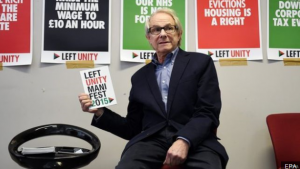 Loach decisively rejected social democracy. Referring to Labour and other similar parties, he said that “they’re mainly social democrat parties that think you can manipulate the markets to the advantage of ordinary people”.
Loach decisively rejected social democracy. Referring to Labour and other similar parties, he said that “they’re mainly social democrat parties that think you can manipulate the markets to the advantage of ordinary people”.
For Loach, such manipulation is impossible: “The market demands cheap labour, it demands labour that can be turned on and off like a tap, zero-hours contracts, short-term contracts, agency work.” For him, the market offers us no other option. Hence social-democratic reformism and Keynesian intervention are both fatally flawed.
Nationalising the supermarkets
The 2014 Constitution of Left Unity supported a mixed economy, as a transitional arrangement within an over-arching national plan. But in its 2015 General Election Manifesto, Left Unity took a much more extreme line, reflecting Loach’s absolutist anti-market views:
Note here the common ownership of all “means of producing wealth”. There are no exceptions. Everything, from banks to supermarkets, would be publicly owned. Marx would have liked that.
Lenin would have also liked the suggestion that this fully planned economy should be run democratically. Lenin argued this in his State and Revolution in 1917. But as soon as his Bolsheviks came to power they had to abandon the idea. Such ultra-democracy is totally impractical.
A quick leap to the higher phase of communism
But Marx might have criticised the Labour Unity Manifesto’s conflation of long and short-term aims. In his Critique of the Gotha Programme, Marx wrote that “from each according to his ability, to each according to his needs” could apply only in
By contrast, Loach and Left and Unity put “to each according to their needs” alongside immediate aims in an election manifesto. It seems that they wanted to leap to “a higher phase of communism” right away.
Loach and Left Unity now want to abolish all markets and all private ownership of the means of production. This went much further than Corbyn and his team, who have argued for a “mixed economy”. But Corbyn’s embrace of Loach and his views might suggest that they share the long-term view that all markets and private enterprise should be abolished.
Even in Marxist terms, the position of Loach and Left Unity on markets is rather crude. Markets have existed for thousands of years. Marx never saw them as the key defining feature of capitalism – instead, for him, it was the system of wage labour. Following Joseph Schumpeter, I would also stress the role of finance.
Resemblances with pro-market economics
But remarkably, the views of Loach and Left Unity replicate some arguments by extreme pro-market economists. Against a majority view, economists such as Ludwig von Mises and Friedrich Hayek argued that a mixed economy cannot work. As von Mises put it in 1949:
Left Unity seems to follow the same logic as these uncompromising, pro-market economists. By contrast, many economists accept that there is a case for some judicious state regulation and intervention in a market economy, to deal with problems such as externalities and market instability.
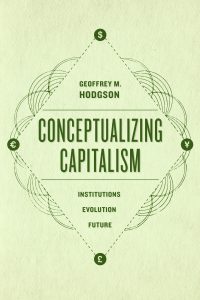 In my book Conceptualizing Capitalism I go further, to argue that the state is necessary to part-constitute the legal framework of a capitalist economy. Hence some state intervention in a market economy is unavoidable. Given this, the practical question for progressives is where and how it should intervene. The literature on varieties of capitalism shows that many different outcomes are possible within capitalism, and defects such as inequality can be significantly diminished.
In my book Conceptualizing Capitalism I go further, to argue that the state is necessary to part-constitute the legal framework of a capitalist economy. Hence some state intervention in a market economy is unavoidable. Given this, the practical question for progressives is where and how it should intervene. The literature on varieties of capitalism shows that many different outcomes are possible within capitalism, and defects such as inequality can be significantly diminished.
In particular, Loach and Left Unity overlook the successes of social democracy, particularly in Northern Europe. During the twentieth century they have built up strong welfare states, redistributed some wealth and regulated markets.
Of course, there have been strong and sustained attempts to reverse these achievements. But it is much more realistic to defend social-democratic gains against the free-marketeers than to urge a quick leap to the higher phase of communism.
Against NATO – for a boycott of Israel
The foreign policy of Left Unity is “anti-imperialist”. Like Corbyn, it calls for Britain to quit NATO. But unlike Corbyn, Left Unity does not support Brexit.
Loach supports the boycott of Israel, calling it an “apartheid regime”. Before his election as leader, Corbyn also pushed for boycotts of Israel. This selective targeting of Israel now seems a widespread opinion among Labour members, but it is not official party policy.
Rather than accepting that anti-Semitism as a problem within Labour, Loach argues that the claims are false: those that raise the issue are trying to undermine Corbyn’s leadership.
Supporting ISIS
Another remarkable incident tells us not so much about Loach, but about some of the people who join Left Unity.
In a 2014 conference of Left Unity, a minority proposed support for the so-called Islamic State in Iraq and Syria (ISIS). True to their Leninist credentials, they argued that the left “has to acknowledge and accept the widespread call for a Caliphate among Muslims as valid and an authentic expression of their emancipatory, anti-imperialist aspirations.” They supported ISIS as a “stabilising force” with “progressive potential”.
A warm welcome
In the 2015 General Election, Left Unity’s parliamentary candidates received a pitiful average of 288 votes – all losing their deposits. Later that year, after Corbyn’s election as Labour leader, Left Unity voted against affiliation to the Labour Party but resolved not to put up any more candidates against Labour.
Because of Corbyn’s leadership victory, several hundred members resigned from Left Unity and joined Labour. Left Unity is now a depleted party, without a viable independent strategy.
It seems that Labour is now welcoming their members, ignoring their extremist and unrealistic views and their fervent opposition to social-democratic reform. This is a suspicious unity of a dubious left.
1 October 2017
Minor edits – 3, 5 Oct 2017
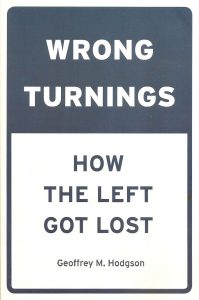 This book elaborates on some of the political issues raised in this blog:
This book elaborates on some of the political issues raised in this blog:
Published by University of Chicago Press in January 2018
Bibliography
Cohen, Nick (2007) What’s Left? How the Left Lost its Way (London and New York: Harper).
Hodgson, Geoffrey M. (2015) Conceptualizing Capitalism: Institutions, Evolution, Future (Chicago: University of Chicago Press).
Hodgson, Geoffrey M. (2017) Wrong Turnings: How the Left Got Lost (Chicago: University of Chicago Press, forthcoming).
Mises, Ludwig von (1949) Human Action: A Treatise on Economics (London and New Haven: William Hodge and Yale University Press).
Rich, Dave (2016) The Left’s Jewish Problem: Jeremy Corbyn, Israel and Anti-Semitism (London: Biteback).
Posted in Common ownership, Democracy, Jeremy Corbyn, Karl Marx, Labour Party, Left politics, Markets, Nationalization, Private enterprise, Socialism, Tony Benn
September 20th, 2017 by geoffhodgson1946

Geoffrey M. Hodgson
I was born in 1946. I lived in a council house until I was 16. My family were Labour. My privilege was not money, but that my parents and grandparents all valued education and culture. But none of them obtained a university degree, because they were less accessible at the time.
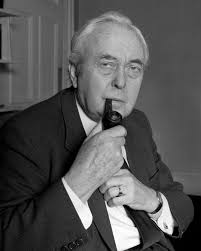
Harold Wilson
I became involved in the Labour Party in 1964 and then saw myself as a Tribune socialist following the steps of great radicals such as Michael Foot. After welcoming Harold Wilson’s election victory in 1964, I became critical of the new Prime Minister because of his nominal support for the US in the Vietnam War.
Vietnam and Marxism
For my baby-boom generation, the Vietnam War was a great generator of radicalism. Like many of my university friends, I became a Marxist in 1966. We were drawn into a turbulent and exciting world that combined activism with ideas and debate. I saw myself as a Marxist until about 1980.
I studied mathematics and philosophy from 1965 to 1968 and economics from 1972 to 1974. Both periods were at the University of Manchester. In the intervening years I taught myself Marxist economics. My knowledge of economics became enduringly significant in my political evolution.
 I was at the LSE student occupation in 1967 and one of the Grosvenor Square demonstrations in 1968. In that year I copied Bertrand Russell and tore up my Labour Party membership card in protest against US aggression in Vietnam.
I was at the LSE student occupation in 1967 and one of the Grosvenor Square demonstrations in 1968. In that year I copied Bertrand Russell and tore up my Labour Party membership card in protest against US aggression in Vietnam.
Marxists dominated the activists on the university campuses. The left was divided and fractious. There were Soviet Bloc loyalists in the Communist Party of Great Britain. There were lovers of Mao Zedong and several rival Trotskyist sects. I could not bring myself to support any totalitarian regime – East or West – so I joined the forerunner of what is now the Socialist Workers’ Party, which saw everything existing as “capitalist”.
My departure from the SWP came in 1971 when they expelled a dissident faction with which I sympathised. (That critical faction eventually became the Alliance for Workers’ Liberty, of Momentum fame in the Corbyn Era.)
I flirted briefly with the International Marxist Group, which included glamorous figures such as Tariq Ali, and Robin Blackburn of the New Left Review. The IMG was stronger in its support for the women’s movement and for gay rights.
After a few years among the sects I could see that something was wrong. These groups were aiming to help create a much better society, but they were generally dogmatic and intolerant. Some were ruthless, pugnacious and fanatical. I did not want to see any social system facilitated or run by these people.

But on the other hand I then accepted the Marxist view that capitalism was exploitative and frequently led to oppression and war. The evidence of this was seemingly before our eyes.
Re-joining Labour and changing strategy
After Labour’s electoral defeat in 1970, there was a strong and growing left in the Labour Party and that seemed the best hope for socialists. Against the advice of Ralph Miliband (whom I knew personally) and others, I re-joined Labour in 1974.
In 1975 I published a pamphlet entitled Trotsky and Fatalistic Marxism. This tried to explain the fanaticism and intolerance of many Marxists in terms of their belief in the imminent decay and collapse of capitalist democracies. Trotskyists had failed to appreciate the enormous expansion and dynamism of capitalism after 1945. Their explanations of the survival of capitalism were weak.
Published in 1977, a longer work entitled Socialism and Parliamentary Democracy elaborated more of my thinking. Marxist-Leninists believed that parliament and the capitalist state should be “smashed”. Influenced by Max Weber and others, I argued that in modern democracies, government drew their perceived legitimacy from parliamentary elections. If socialism became a majority view, then socialists could and should gain a majority in parliament.
In the book I criticised the 1968 revolutionary movement in France for boycotting the elections called by President Charles de Gaulle in that year. Victory in the elections gave de Gaulle legitimacy. The huge movement of students and workers was crushed.

Paris – May 1968
As I had anticipated, my heresies were dismissed out of hand by the far left sects. But the book proved to be rather influential in the UK and internationally. It received a strongly sympathetic hearing on the Labour left. It was translated into Italian, Japanese, Spanish and Turkish. It persuaded a leading member of the violent Basque separatist group ETA to abandon terrorism.
I don’t know if he read my book, but Daniel Cohn-Bendit, the leader of the revolutionary movement in France in May 1968, later argued that it had been a mistake to boycott the French parliamentary elections.
Labour had been reconciled to the parliamentary road to socialism since its formation. The sects argued that it wouldn’t work. My response was that insurrection would not work either. In democracies we needed a combination of parliamentary and extra-parliamentary action.
Questioning ends as well as means
The killing fields in Cambodia affected me deeply. After seizing power in 1975 the Khmer Rouge forced everyone into the countryside and obliterated about two million people – a quarter of the Cambodian population – in the pursuit of their communist utopia.
I could not dismiss this as an aberration. After all, the Khmer Rouge aims, which included the abolition of money, private property and markets, were central to the Communist Manifesto by Karl Marx and Frederick Engels.

Khmer Rouge Killing Fields
The far left were able to publish papers and debate ideas because they lived in a democracy that tolerated freedom of expression. But the ideas and actions of the sects, if they gained influence or power, would curtail these very liberties upon which they had depended.
Crucially, I was not naïve enough to believe that freedom and political pluralism could be guaranteed simply by the goodwill of a more enlightened Marxist leadership, who valued these things more than the Khmer Rouge. Good intentions were not enough.
I had retained a good lesson from Marxism. Effective ideas and practices draw their strength from agglomerations of power sustained by the structures of the politico-economic system. Hence a genuinely pluralist and tolerant political sphere depended on pluralism and decentralisation in the economic domain. A pluralist polity requires a pluralist economy.
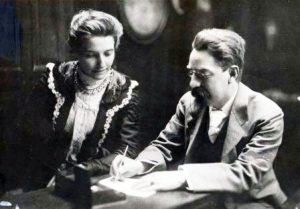
Beatrice & Sidney Webb
Prominent Labour thinkers such as Beatrice Webb, Sidney Webb and G. D. H. Cole had all argued for a decentralised socialist system. But they still sought the abolition of private property and markets. The state would ultimately own everything. So what institutional, legal or other politico-economic forces could stop it retrieving all delegated powers to the centre, when deemed required, or when goodwill wore thin?
Any viable socialism always needs markets
I came to the view that genuine and lasting decentralisation would depend on the existence of organisations with some genuine autonomy and legal independence, providing powers to own property and trade with other organisations. Any viable socialism would always need markets – it was not simply a matter of tolerating or compromising with them.
This crucial transition of my thinking occurred between 1977 and 1980. I cannot recall the detailed influences. But I am sure that the initial impetus did not come from Ludwig von Mises or Friedrich Hayek. I did not delve deeply into their works until the early 1980s.

János Kornai
There had been several socialist proposals to nationalise the sector producing capital goods but retain competition and markets for consumer goods. I was more attracted by the Hungarian economist János Kornai’s more sophisticated proposal (originally published in 1965) to use a dynamic combination of markets and planning, where planning provided strategic impetus, and markets signalled information and gave scope for innovation and planning adjustment.
Over the new year of 1979-1980 I went on a short tourist group visit to the Soviet Union. Some of my companions were dewy-eyed admirers of the system, but I was prepared for its flaws, including the ubiquitous black markets and corruption.
I had been given the address in Moscow of an Englishman married to a Russian. As a former Communist, he explained in detail in his apartment how and why his views had quickly changed: “I challenge any supporter of the Soviet Union to live here just for six months.”
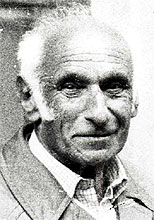
Alec Nove
When Alec Nove published a classic article on feasible socialism in New Left Review in early 1980 I was ready for it. Nove also argued that markets were essential to any viable socialism. He realised that he was attacking deeply-ingrained orthodoxy on the left.
(Later I had the pleasure of meeting both Kornai and Nove several times. Nove died in 1994 but Kornai is still alive. I am delighted to be invited as a keynote speaker at a conference in his honour in Budapest in 2018.)
Labouring as a revisionist
Any acceptance of markets was an anathema to followers of both Karl Marx and Tony Benn. Benn distanced himself from those who supported the persistence of markets.
But I found common ground with Benn and others over what was called “the alternative economic strategy”. I outlined my positive views on this in a pamphlet entitled Socialist Economic Strategy in 1979. It was published by Independent Labour Publications.
Independent Labour Publications was the residue of the old Independent Labour Party, which had played a central role in Labour history from the 1890s to the 1940s. The Independent Labour Party split from the Labour Party in 1931. But in 1975 it formally dissolved as a party and rejoined Labour as Independent Labour Publications.
I was involved in this organisation briefly. Despite outward appearances they turned out to be another sect, lacking any vision of a workable socialism. They too were uneasy about my revisionism. Although my Socialist Economic Strategy was a bestseller by their standards, they refused to reprint it. We parted company in 1981.

Geoff Hodgson, Jean Shepherd & John Maguire in 1979
In 1979 I was the unsuccessful Labour Parliamentary Candidate for Manchester Withington. The seat became Labour in 1987.
I met Benn a few times and supported him in the 1981 deputy leadership election. This alignment was marked in my book Labour at the Crossroads, published in that year. Therein I again supported the alternative economic strategy. But against Benn himself, I argued in that book that in some sectors of the economy “there is no substitute for competition and a market” (p. 206).
(In his important book on The Labour Party’s Political Thought, Geoffrey Foote quotes me (pp. 320, 347) as a “Bennite”. But because of my explicit acceptance of markets, I was unrepresentative of the Bennite stream of thought.)
Subsequently my opinion of Benn shifted. He was a magnificent speaker, but his writings on socialism are vague and unclear. His use of history is unscholarly and cavalier. He was not a well-read intellectual like Michael Foot.

Tony Benn at a Militant meeting
While Benn’s “alternative economic strategy” accepted markets and a private sector for the present, it seemed to me that he wanted to move eventually toward a socialist economy without any markets at all. It was no accident that Benn and his followers defended the Trotskyist sect Militant when they were pushed out of the party from 1985 to 1992.
In 1984 I published my book on The Democratic Economy, where I set out my view on the importance and complementarity of both markets and planning. My argument was framed in socialist language but therein I distanced myself from Marxism. The book received a critical response from many on both the soft and hard left.
The Labour Coordinating Committee
Margaret Thatcher came to power in 1979. One of Thatcher’s most popular policies was to promote the sale of council-owned housing to the tenants. Labour had opposed this policy. The disastrous 1983 defeat of Labour on a Bennite manifesto prompted a rethink, on this and several other issues.
For some of us, this rethink amounted to more than expedient doctrinal trimming. Encouraging home ownership was really a good idea: why should all property be owned by the rich? But while supporting home ownership, we argued that the government should also build more social housing and enlarge the stock available for rent by low-income families.
But these ideas met stiff resistance in the Labour Party ranks, and not simply from Trotskyist entryists such as Militant. The resistance from Benn and his supporters was substantial and even more enduring. It was clear that old-fashioned socialist ideas still had a tenacious appeal among Labour’s membership.
The Labour Coordinating Committee (LCC) became one of the primary modernising forces within Labour. Its leadership included Hilary Benn, Cherie Blair, Mike Gapes, Peter Hain, Harriet Harman, Kate Hoey (the Brexiteer) and others of enduring fame. I was elected to the LCC executive committee. We worked closely with the new leader Neil Kinnock, and with members of his shadow cabinet, including Robin Cook.
Changing Clause Four
I have detailed elsewhere my LCC attempt to bring about discussion to change Labour’s Clause Four. The version that had been in place since 1918 called for the “common ownership of the means of production, distribution and exchange”. This provided for no exception: all production would be in common ownership and there would be no private sector.
Although some Labour Party thinkers began to entertain the possibility of some private enterprise, many party members remained resolutely in support of widespread common ownership.
Against my efforts, the 1983 AGM of the Labour Coordinating Committee defeated the proposal that Clause Four should be rewritten. This was out of fear of antagonising the Benn wing. Instead, the LCC resolved that Clause Four should be “clarified”.
But a resolution on long-term aims, which I had helped to draft, was passed by a large majority. The resolution called for the Labour Party to draft a new statement of aims, upholding “that socialism involves extended democracy and real equality. Democracy under socialism is extended to industry and the community … and must involve a substantial decentralisation of power.”
There was a commitment to “political pluralism” and to “economic pluralism” involving “a variety of forms of common ownership … and the toleration of a small private sector including self-employed workers and other private firms.” The economy must be dominated by mechanisms of “democratic planning … but also accommodating a market mechanism in some areas.”
But there was strong hostility to these mildly revisionist ideas from within Labour’s ranks at the time, including from Jeremy Corbyn and Tony Benn.

Tony Benn & Jeremy Corbyn
The Guardian newspaper reported the LCC conference with the headline: “Labour breaks taboo on ownership”. For a while, the LCC tried to keep the conversation going on the need to revise Labour’s aims. The LCC held a conference in Liverpool in June 1984 on “The Socialist Vision”. But enthusiasm for this discussion fizzled out. By 1985 the LCC’s revisionist initiative had been kicked into the long grass. My efforts had failed.
But to their credit, Neil Kinnock and his deputy Roy Hattersley saw the need for Labour to modernise its aims. I advised them both for a while. But after 1987 I became less active in the Labour Party. My inactivity was born partly out of frustration that it was so difficult to shift Labour from its congenital hostility to markets and private enterprise.
But after a fourth election defeat in 1992 the party became more pliable. Tony Blair was elected as leader in 1994. Blair successfully changed the wording of Clause Four to endorse a strong private sector, but the dramatic rise of Corbyn in the party since 2015 shows that the old collectivist DNA has endured.
Towards liberalism
In many ways I have always been a liberal, especially in my support for freedom of expression, other human rights and democracy. By the late 1970s I also accepted the importance of markets and private property. But the emphasis in my thinking has shifted further in the last 30 years.
My academic works show a few markers of my political evolution. On page xvi of my 1999 book Economics and Utopia I wrote of my common ground with the US liberal John Dewey and with
“British social liberalism, which stretches from John Stuart Mill through Thomas H. Green to John A. Hobson, John Maynard Keynes and William Beveridge.”
These thinkers still inspire me. But I would now also stress the importance of Thomas Paine. Other heroes include George Orwell and Arthur Koestler.
So by 1999 I was a true liberal, of social-democratic stripe. I had already moved some distance from the ideas in my 1984 book, which had over-stressed the possibilities for large-scale planning and for extensive democratic decision-making in large, complex economies.
But I still believe in judicious state intervention and regulation, and I am still an enthusiast for experiments with worker cooperatives and other forms of worker and community participation. With their lower levels of economic inequality, I see the Nordic countries as good role models for in the rest of the capitalist world.
From leaving Labour to joining the Liberal Democrats
In 2001 I left the Labour Party because of Blair’s energetic support for faith schools, Labour’s inadequate proposal for House of Lords reform and its neglect of the problem of economic inequality. I would have left over the Iraq War. Previously I had sometimes voted tactically for the Liberal Party, when they were second behind the Tories in my constituency. But what was tactical was also in growing part a matter of conviction.
I voted Liberal Democrat in the 1997, 2001, 2005 and 2010 general elections. But I did not approve of the coalition with the Tories. So the Liberal Democrats did not get my vote in 2015.
I re-entered political activity in 2016 after the Brexit referendum. My wife (Vinny Logan) had been a critical but close companion on my long journey since 1980. But unlike me she had always voted Labour. After the Brexit vote she joined the Liberal Democrats and I followed her after a few days. It will be a long hard slog to change British politics for the better, but it is vital that we try.
My wife and I were each brought up in a social culture where the Tories and the Establishment were the enemy, and the Liberals were seen as wishy-washy waverers in the class war. Labour was the only game in town.
It takes a long time to remove these ingrained preconceptions and learn that liberalism is the greatest legacy of the Enlightenment. It is the strongest guardian of both prosperity and freedom. Although Liberals have been in a minority, they are largely responsible for the foundation of the British welfare state. The NHS was originally a Liberal proposal. The Liberal Democrats constitute the most pro-EU party in the UK.
But some Liberal Democrats do not understand that it is the job of government in a recession to increase effective demand, particularly by increasing investment and raising disposable incomes for the poor. But the party is a broad church, and I will argue my corner in favour of Keynesian liberal economic policies.
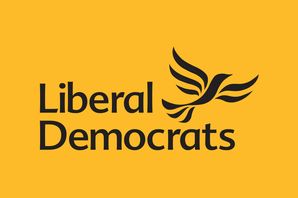 I am a radical liberal. I believe in social solidarity with the less-privileged, as well as in individual rights. As Charles Kennedy showed when he was leader, the Liberal Democrats can succeed when they take principled, radical positions on justice, equality and war.
I am a radical liberal. I believe in social solidarity with the less-privileged, as well as in individual rights. As Charles Kennedy showed when he was leader, the Liberal Democrats can succeed when they take principled, radical positions on justice, equality and war.
Today, both the Conservatives (now ruled by deceitful nationalists) and Labour (where the rising hard left dominate the timid moderates) are dangerous threats to the liberal and democratic rights and values that in the past we have taken too much for granted. We must now stand up to defend those rights and values, against dogma, ignorance, intolerance, petty nationalism and deceit.
20 September 2017
Minor edits – 25 September 2017, 22 October 2017, 10 April 2018.
This book elaborates on some of the political issues raised in this blog:
Published by University of Chicago Press in January 2018 
Bibliography
Foote, Geoffrey (1997) The Labour Party’s Political Thought: A History, 3rd edn. (London: Palgrave).
Hodgson, Geoffrey M. (1975) Trotsky and Fatalistic Marxism (Nottingham: Spokesman).
Hodgson, Geoffrey M. (1977) Socialism and Parliamentary Democracy (Nottingham: Spokesman).
Hodgson, Geoffrey M. (1979) Socialist Economic Strategy (Leeds: Independent Labour Publications).
Hodgson, Geoffrey M. (1981) Labour at the Crossroads: The Political and Economic Challenge to Labour Party in the 1980s (Oxford: Martin Robertson).
Hodgson, Geoffrey M. (1984) The Democratic Economy: A New Look at Planning, Markets and Power (Harmondsworth: Penguin).
Hodgson, Geoffrey M. (1999) Economics and Utopia: Why the Learning Economy is not the End of History (London and New York: Routledge).
Hodgson, Geoffrey M. (2017) Wrong Turnings: How the Left Got Lost (Chicago: University of Chicago Press, forthcoming).
Kornai, János (1965) ‘Mathematical Programming as a Tool of Socialist Economic Planning’, reprinted in Nove, Alec and Nuti, D. M. (eds) (1972) Socialist Economics (Harmondsworth: Penguin), pp. 475-488.
Nove, Alec (1980) ‘The Soviet Economy: Problems and Prospects’, New Left Review, no. 119, January-February, pp. 3-19.
Nove, Alec (1983) The Economics of Feasible Socialism (London: George Allen and Unwin).
Nove, Alec and Nuti, D. M. (eds) (1972) Socialist Economics (Harmondsworth: Penguin).
Posted in Bertrand Russell, Common ownership, Democracy, Jeremy Corbyn, Karl Marx, Khmer Rouge, Labour Party, Left politics, Liberalism, Ludwig von Mises, Mao Zedong, Markets, Nationalization, Private enterprise, Property, Right politics, Socialism, Soviet Union, Tony Benn
September 13th, 2017 by geoffhodgson1946
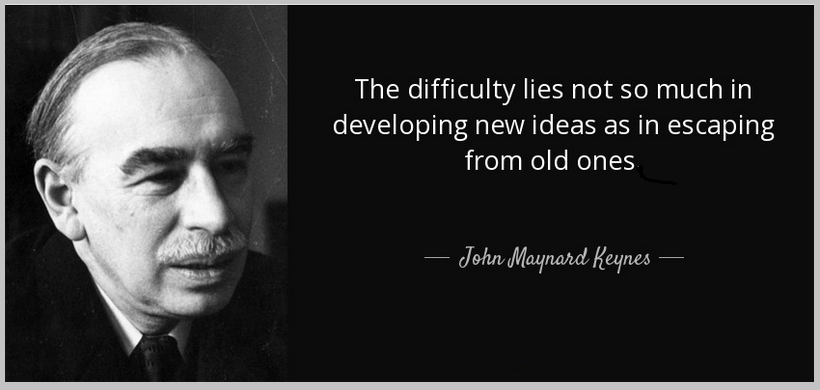
Geoffrey M. Hodgson
Many people still call themselves socialists. But rarely is it made clear what they mean by the description. Few seem aware of its original definition, which persisted from the 1830s to the 1950s. Some will argue that the word has acquired a new meaning since then. Words do change their meanings. But there is no consensus on what that new meaning is.
Despite its idealistic connotations of purity and principle, the word socialism hangs around the neck of left parties. It serves as an invitation for infiltration by Marxists and others, who may enter any party proclaiming their “democratic socialism” or their “socialist principles”.
Having being invited by the s-word, they simply have to point to its original meaning to justify their maximalist stances on class struggle and public ownership. The retention of the s-word will always feed the hard left.
Owenites and Marxists
The term socialist emerged in English for the first time in 1827 in the Co-operative Magazine, which was published in London by followers of Robert Owen. It moved into wider usage in the 1830s. For Owen and his followers, socialism meant the abolition of private property. It also acquired the broader ideological connotation of cooperation, in opposition to selfish individualism.
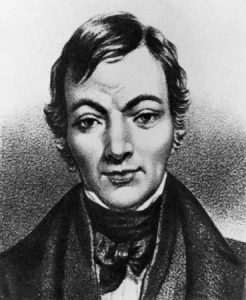
Robert Owen
As Owen argued in 1840, “virtue and happiness could never be attained” in “any system in which private property was admitted”. He aimed to secure “an equality of wealth and rank, by merging all private into public property”.
Owen and his followers attempted to establish several socialist communities in the UK and USA. All failed within a few years. The young Frederick Engels attended an Owenite meeting in Manchester in 1843, and was inspired by Owen’s notion of socialism.
Marx and Engels wanted the complete abolition of the “free selling and buying” of commodities. They advocated common ownership of all means of production and the abolition of commodity exchange and markets.
Hence, from the 1830s until the 1950s, socialism was almost universally defined in terms of the abolition or minimisation of private property and some form of widespread common ownership.
Statist socialism
Marx and Engels insisted that markets should be abolished and all means of production should be placed in the hands of the state.
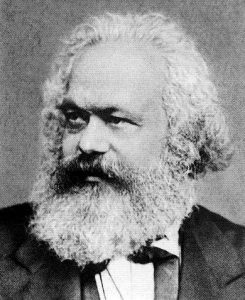
Karl Marx
Marx and Engels often used the term communism instead of socialism. But this was primarily to distance themselves from the naïve ideas of contemporary socialists rather than to postulate a radically different objective. For them, communism was a label for their movement, rather than their goal. Thus in 1845 they wrote:
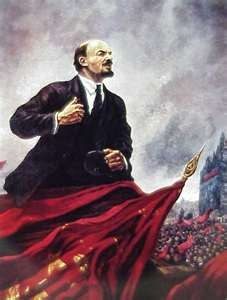 Sometimes, as in his Critique of the Gotha Programme of 1875, Marx referred to the “lower” and “higher phases” of communism, instead of socialism.
Sometimes, as in his Critique of the Gotha Programme of 1875, Marx referred to the “lower” and “higher phases” of communism, instead of socialism.
In 1917 Vladimir Ilych Lenin was writing his State and Revolution, on the eve of the Bolshevik seizure of power. Some left critics had argued that Russia was insufficiently developed for socialist revolution.
So Lenin redefined socialism as a transitional stage (still involving extensive state ownership) between capitalism and communism.
By contrast, Marx and Engels did not use the term socialism to refer to a future stage between capitalism and communism. Their aim was described interchangeably as socialism or communism.
French lessons
Engels’ description of Charles Fourier and Claude-Henri de Saint-Simon as “utopian socialists” is inaccurate because – unlike Owen – they supported private ownership of the means of production. They imagined harmonious communities without poverty or strife. But some of Saint-Simon’s followers moved toward socialism.
Philippe Buchez was inspired by Saint-Simon. He promoted worker cooperatives as early as 1831, and his ideas became prominent during the French Revolution of 1848.
Contrary to most of his contemporary socialists and communists, Buchez and his followers eventually recognized the need for multiple, autonomous, worker co-operatives, each owning property and engaging in contracts and markets.
But this tolerance of markets was too much for Marx. In 1875 he described Buchez’s ideas as “reactionary”, “sectarian”, opposed to the workers’ “class movement”, and contrary to the true revolutionary aim of “cooperative production … on a national scale”.

Pierre Joseph Proudhon
In 1840 Pierre Joseph Proudhon published his What is Property? He used both socialism and anarchism to describe his proposed future society. But, like Buchez, Proudhon proposed a system of worker cooperatives linked by contracts and trade. This enraged Marx and Engels, who relentlessly attached Proudhon’s ideas.
Non-statist versions of socialism endured but were overshadowed by statist variants. From the 1870s to the 1950s the dominant view of socialism involved state ownership and control. To emphasise their dissent, Proudhon and other opponents of statist socialism often described themselves as anarchists.
Fabianism
The idea that private property and markets should be abolished was thematic to socialism and unconfined to Marxism. It pervaded the writings of socialists as diverse as Continental revolutionary communists and British Fabians. At least until the 1950s, hostility towards markets and private property were thematic for socialism as a whole. The founding influences of Owen and Marx were long-lasting.

Beatrice & Sidney Webb
Drafted by leading Fabians Sidney and Beatrice Webb, Clause Four, Part Four of the Labour Party Constitution encapsulated collectivist thinking when it was adopted in 1918:
“To secure for the workers by hand or by brain the full fruits of their industry and the most equitable distribution thereof that may be possible upon the basis of the common ownership of the means of production, distribution and exchange, and the best obtainable system of popular administration and control of each industry or service.”
This provided for no exception: all production would be in common ownership and there would be no private sector. Although some Labour Party thinkers began to entertain the possibility of some private enterprise, many party members remained resolutely in support of widespread common ownership.
Some Fabian socialists tried to lay out more detail on how socialism would work. The Webbs laid out their ultimate vision of a fully planned and consciously controlled socialist economy where all markets and private ownership of the means of production had been marginalized to insignificance. They wanted private ownership of the means of production to be ended: it was a “perversion”.
They envisaged a massive, complex structure of national, regional and local committees, all involved in decision-making over details of production and distribution. How would these cope with the huge amounts of information and specialized knowledge in modern complex economies? It was simply assumed that this was relatively easy to sort out in some rational manner.
Guild socialism
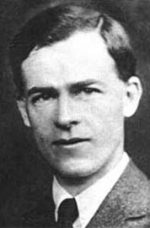
G D H Cole
The British Fabian G. D. H. Cole is sometimes described as a “libertarian socialist” and as an advocate of “decentralized” or “guild” socialism. But he supported the wholesale nationalisation of industry and the abolition of private enterprise. To his great credit, and unlike most Marxists, Cole did actually try to explain how a future socialist society would work. But his explanation is a failure.
Cole did not show how devolved democracy could function and endure in a society where private property was abolished. His hyper-democratic account of socialism, where individuals make decisions throughout industry as well as the polity, failed to consider the problems of necessary skill in judgment, of obtaining relevant knowledge, and the overwhelming number of meetings and decisions involved.
Cole’s vision of socialism was of an integrated, national system where “a single authority is responsible both for the planning of the social production as a whole and for the distribution of the incomes which will be used in buying it.” Within this “single authority” he also sought devolved worker control. He wanted local autonomy of manufacturing, modelled on the medieval guild.
But Cole was tragically unclear about how the two were to be reconciled. How would the autonomous powers of the latter be protected from the control and centralizing ambitions of the “single authority”? There was no adequate answer. His whole system was unworkable.
Clement Attlee and Bertrand Russell
In 1937, eight years before he became UK Prime Minister, Clement Attlee wrote of the “evils” of capitalism: their “cause is the private ownership of the means of life; the remedy is public ownership.” Attlee then approvingly quoted the words of Bertrand Russell:
“Socialism means the common ownership of land and capital together with a democratic form of government. … It involves the abolition of all unearned wealth and of all private control over the means of livelihood of the workers”.
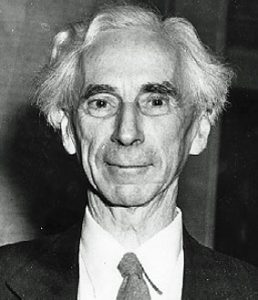
Bertrand Russell
Even within the moderate and non-Marxist Labour Party, the word socialism endured with these collectivist connotations, posed in opposition to private firms, competition and markets.
Russell represented an important strain of thinking within the British left. He wholeheartedly supported the notion of a publicly-owned and planned economy, but he rejected “Bolshevik methods”.
But is it possible to promote a state monopoly of economic power, while preventing a central-state monopoly and potential despotism of political power? In no historical case has the first happened and the second been prevented. Statist socialism, with viable democracy, political pluralism and effective decentralisation, exits only in the imagination of impractical idealists.
‘Market socialism’?
In the 1930s the economist Oskar Lange and others claimed that mainstream economic theory can show how socialism could work. Lange and his co-workers argued that managers of firms should be instructed to expand production until marginal costs were equal to the declared market price of the product.
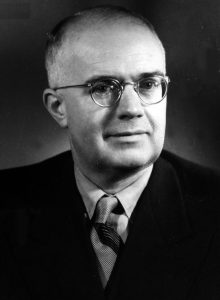
Oskar Lange
But this assumed that marginal costs could be calculated and that the central planners could smoothly and readily assess whether there were surpluses or shortages, and adjust prices accordingly. Lange and others wrongly assumed that such information was readily available.
These proposals for “market socialism” attempted to simulate markets within a planning system, rather than to establish true markets with private ownership and commodity exchange. There was no private ownership and no capacity for firms to make contracts. The models developed by Lange and his collaborators involved a high degree of centralised co-ordination that excluded any real-world market.
Significantly, no attempt has ever been made to implement a Lange-type model in reality. Lange himself made no effort to persuade the post-1945 “socialist” government in his native Poland of the value of the idea.
Hence the use of the term “market socialism” in this context is highly misleading. Unlike the proposals of Buchez or Proudhon, and unlike the system of worker cooperatives established under Josip Tito in Yugoslavia after the Second World War, Lange’s proposal did not involve true markets.
Post-war revisionism
In 1956 C. Anthony Crosland published The Future of Socialism. This began Labour’s slow reconciliation with markets, private enterprise and a mixed economy. Signalling an attempted shift of meaning, Crosland argued that the central aim of socialism was not necessarily common ownership, but social justice and economic equality, and these could be achieved by different means. But although his argument was highly influential, it was widely attacked within the Labour Party and elsewhere.
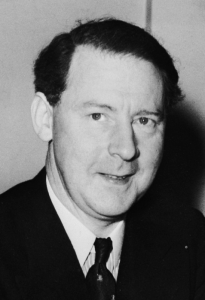
Hugh Gaitskell
In 1959 the (West) German Social Democratic Party abandoned the goal of widespread common ownership. In the same year, Hugh Gaitskell tried to get the British Labour Party to follow this lead, but met stiff resistance. The party did not ditch its Clause Four commitment to the complete “common ownership of the means of production, distribution and exchange” until 1995.
Richard Toye noted that the Labour Party assumed widespread public ownership and failed to develop adequate policies concerning the private sector:
“Labour, until at least the 1950s, showed little interest in developing policies for the private sector. During the 1960s, the party demonstrated continuing ambiguity about whether or not competition was a good thing. This ambiguity continued at least until the 1980s.”
Tony Blair and New Labour
But in 1995, after 77 years, Labour’s Clause Four was changed. Tony Blair successfully ended the Labour Party’s longstanding constitutional commitment to far-reaching common ownership. But this was not without opposition. Tony Benn protested: “Labour’s heart is being cut out”.
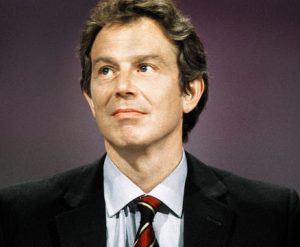
Tony Blair
The new wording of “Clause IV: Aims and Values” declared that: “The Labour Party is a democratic socialist party.” But the clause ceased to promote unalloyed common ownership and the full text admitted a positive role for markets and a private sector.
By contrast, the 1918 formulation did not use the word socialism – it had undiluted common ownership instead.
Blair introduced the word socialism in 1995, but he attempted to change its meaning. He promoted “social-ism”, which now meant recognizing individuals as socially interdependent. It also signalled social justice, cohesion and equality of opportunity, within a mixed economy involving both private and public ownership.
Hence, instead of tackling the problem of Labour’s old collectivist DNA more directly, Blair tried to change the meaning of socialism and to airbrush Labour’s history. He failed to promote an adequate alternative vision or philosophy within Labour to replace old-fashioned common ownership. To the traditional left, it appeared as the substitution of purity and socialist principle by fudge and capitalist compromise.
But oddly Blair was responsible for the explicit insertion of socialism in its aims. This inadvertently played into the hands of the party’s enduring, backward-looking left.
Learning no lessons
Blair’s invasion of Iraq in 2003 and the financial crash of 2008 helped to turn the Labour membership against Blair and his compromises with capitalism. As evidence of the Freudian defence mechanism of regression as a response to severe stress, Labour reverted to an earlier stage of its history, re-adopting its infant ideological comforts of collectivism and state control.
The ghost of Tony Benn emerged. His Campaign Group in parliament moved from the margins to the party mainstream.
Like Benn, the current leadership of the UK Labour Party shows little awareness of the chronic problems of managing a modern, complex, centrally-planned economy. They now accept a “mixed economy” as a transition stage, but fail to promote the virtues or enduring role of the private sector.
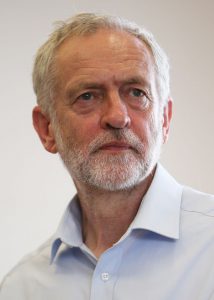
Jeremy Corbyn
To take one example, Jeremy Corbyn’s 2015 address to the UK Co-operative Party is overwhelming in its blandness and naivety. Therein Corby shows no awareness that viable and meaningful decentralisation of economic power must involve (cooperative or other) firms with the right to own, set prices for, and trade their outputs. He rightly mentions the virtues of worker and consumer participation in decision-making, but shows no awareness of the practical limits of such participation.
Corbyn simply waved the magic wand of “democracy” without any apparent appreciation that it is impossible to involve everyone in more than a tiny fraction of all the complex decisions involved in any modern economy. Corbyn showed no awareness of the practical problems of complex decision-making in large organisations, which are dependent on multiple, localised, skills and expertise.
Withering socialism
Following Labour’s advances in the 2017 general election, the leadership of Corbyn and his allies seems entrenched. Recently they have gained control of the powerful National Executive Committee of the party. For future nominations for the Labour leadership or deputy leadership, it is probable that the 15 per cent threshold of support from Labour MPs will be lowered, making ongoing hard left prominence more likely.
In the 1980s and 1990s the hard left were pushed back with the help of large, moderate trade unions that were affiliated to Labour. Those countervailing forces have gone. The unions are smaller and some are more inclined to the hard left.
 With the Brexit vote in 2016, Britain has entered its most dangerous political crisis since the Second World War. The country is governed by an inept Conservative Party that is tearing up the UK constitution and concentrating unprecedented power in the hands of its duplicitous ministers.
With the Brexit vote in 2016, Britain has entered its most dangerous political crisis since the Second World War. The country is governed by an inept Conservative Party that is tearing up the UK constitution and concentrating unprecedented power in the hands of its duplicitous ministers.
Labour’s 2017 electoral advances were partly due to Tory incompetence. In this volatile climate it is possible that Corbyn could soon become prime minister. Subsequently, an obvious danger would be that the concentration of executive power legislated by Tory opponents would prove too tempting for Labour in power to relinquish. After growing authoritarianism from the reactionary right, we might experience a new, collectivist authoritarianism from Labour.
A Labour government committed to dealing with the severe crises in the health, education and housing sectors can bring positive benefits. Substantial state intervention is needed to regulate markets, especially in the area of finance. But such a programme needs to be tempered by heavy measures of pragmatism, pluralism, cautious experimentation and ideological humility that are alien to the current leadership.
They show no sign that they have abandoned their old, statist socialism. There is no recognition that markets and substantial private enterprise are necessary to sustain autonomy and decentralisation. As has become apparent in Corbyn’s favourite socialist experiment in Venezuela, the road to hell is paved with good intentions.
Conclusion – More French lessons
However outdated, it is difficult to dislodge the core principles upon which any party is founded. France provides an important illustration. Michel Rocard was a leading member of the French Socialist Party and a prime minister under François Mitterand. He long argued that French socialists

Emmanuel Macron
had failed to modernise and to accept the enduring importance of private property and markets.
Emmanuel Macron was a protégée of Rocard. Macron gained presidential power after breaking from the fractured Socialist Party and building a powerful centre force. Perhaps there are some lessons for progressives in Britain. It would not be the first time that the French have shown us the way forward.
13 September 2017
Minor edits: 16, 21 September 2017
This book elaborates on some of the political issues raised in this blog:
Published by University of Chicago Press in January 2018

Bibliography
Attlee, Clement R. (1937) The Labour Party in Perspective (London: Gollancz).
Bestor, Arthur E., Jr (1948) ‘The Evolution of the Socialist Vocabulary’, Journal of the History of Ideas, 9(3), June, pp. 259-302.
Blair, Tony (1994) Socialism, Fabian Pamphlet 565 (London: Fabian Society).
Cole, George D. H. (1920) Guild Socialism Re-Stated (London: Parsons).
Crosland, C. Anthony R. (1956) The Future of Socialism (London: Jonathan Cape).
Harrison, J. F. C. (1969) Robert Owen and the Owenites in Britain and America (London: Routledge and Kegan Paul).
Hodgson, Geoffrey M. (2017) Wrong Turnings: How the Left Got Lost (Chicago: University of Chicago Press, forthcoming).
Owen, Robert (1991) A New View of Society and Other Writings (Harmondsworth: Penguin).
Landauer, Carl A. (1959) European Socialism: A History of Ideas and Movements from the Industrial Revolution to Hitler’s Seizure of Power, 2 vols. (Berkeley: University of California Press).
Lange, Oskar R. and Taylor, Frederick M. (1938) On the Economic Theory of Socialism (Minneapolis: University of Minnesota Press).
Proudhon, Pierre Joseph (1890) What is Property?: An Inquiry into the Principle of Right and Government, translated from the French edition of 1840 (New York: Humbold).
Russell, Bertrand (1920) The Practice and Theory of Bolshevism (London: George Allen and Unwin).
Steele, David Ramsay (1992) From Marx to Mises: Post-Capitalist Society and the Challenge of Economic Calculation (La Salle, Illinois: Open Court).
Toye, Richard (2004) ‘The Smallest Party in History’? New Labour in Historical Perspective’, Labour History Review, 69(1), April, pp. 83-104.
Webb, Sidney J. and Webb, Beatrice (1920) A Constitution for the Socialist Commonwealth of Great Britain (London: Longmans Green).
Posted in Bertrand Russell, Brexit, Common ownership, Democracy, Jeremy Corbyn, Karl Marx, Labour Party, Left politics, Lenin, Markets, Nationalization, Private enterprise, Robert Owen, Socialism, Tony Benn, Tony Blair, Tony Blair, Venezuela
May 8th, 2017 by geoffhodgson1946
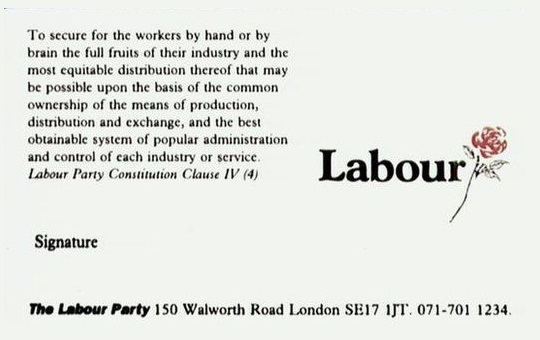
Geoffrey M. Hodgson
This is in part a personal memoir – concerning my role in a minor episode in political history. More importantly, it has lessons concerning Labour’s ideological inertia – the difficulty of modernising the party and bringing it from the nineteenth to the twenty-first century.
Socialism and Labour’s Clause Four
Both Robert Owen and Karl Marx defined socialism as “the abolition of private property”. This kind of collectivist thinking was encapsulated in Clause Four, Part Four of the Labour Party Constitution when it was adopted in 1918:
“To secure for the workers by hand or by brain the full fruits of their industry and the most equitable distribution thereof that may be possible upon the basis of the common ownership of the means of production, distribution and exchange, and the best obtainable system of popular administration and control of each industry or service.”
This provided for no exception: all production would be in common ownership and there would be no private sector. Although some Labour Party thinkers began to entertain the possibility of some private enterprise, many party members remained resolutely in support of widespread common ownership.
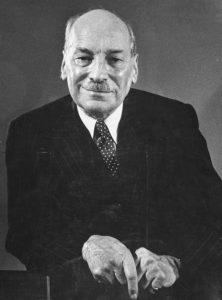
Clement Attlee
In 1937, eight years before he became Prime Minister, Clement Attlee approvingly quoted the words of Bertrand Russell: “Socialism means the common ownership of land and capital together with a democratic form of government. … It involves the abolition of all unearned wealth and of all private control over the means of livelihood of the workers.”
After 1945, the position of many leading Labour Party members began to shift. First the realities of gaining and holding on to power – as a majority party for the first time – dramatized the political and practical unfeasibility of abolishing all private enterprise. Some nationalization was achieved, but a large private sector remained.
In 1956 C. Anthony Crosland published The Future of Socialism. This sought a reconciliation with markets, private enterprise and a mixed economy. In 1959 the (West) German Social Democratic Party abandoned the goal of widespread common ownership. In the same year, Hugh Gaitskell tried to get the British Labour Party to follow this lead, but met stiff resistance. Clause Four remained intact.
Richard Toye noted that the Labour Party assumed widespread public ownership and failed to develop adequate policies concerning the private sector:
“Labour, until at least the 1950s, showed little interest in developing policies for the private sector. During the 1960s, the party demonstrated continuing ambiguity about whether or not competition was a good thing. This ambiguity continued at least until the 1980s.”
The Thatcher Revolution
There were Labour governments from 1964 to 1970 and from 1974 to 1979. But then Margaret Thatcher came to power.
After this defeat, Labour’s instinct was to turn to the left, in the belief that it could have held onto power if it had held to classical socialist principles. Michael Foot was elected as leader, and Dennis Healey narrowly defeated Tony Benn for the position of deputy leader.
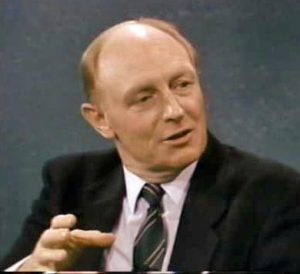
Neil Kinnock
Despite a severe recession with millions unemployed, following the implementation of monetarist austerity policies, Labour suffered a massive defeat in the 1983 general election. Labour’s share of the vote fell below 28 per cent – the party’s lowest figure since 1918. Michael Foot resigned as leader and Neil Kinnock took his place.
Thatcher had boosted her popularity due the Falklands War. One of Thatcher’s most popular domestic policies was to promote the sale of council-owned housing to the tenants. Labour had opposed this policy. The 1983 defeat prompted a rethink, on this and other issues.
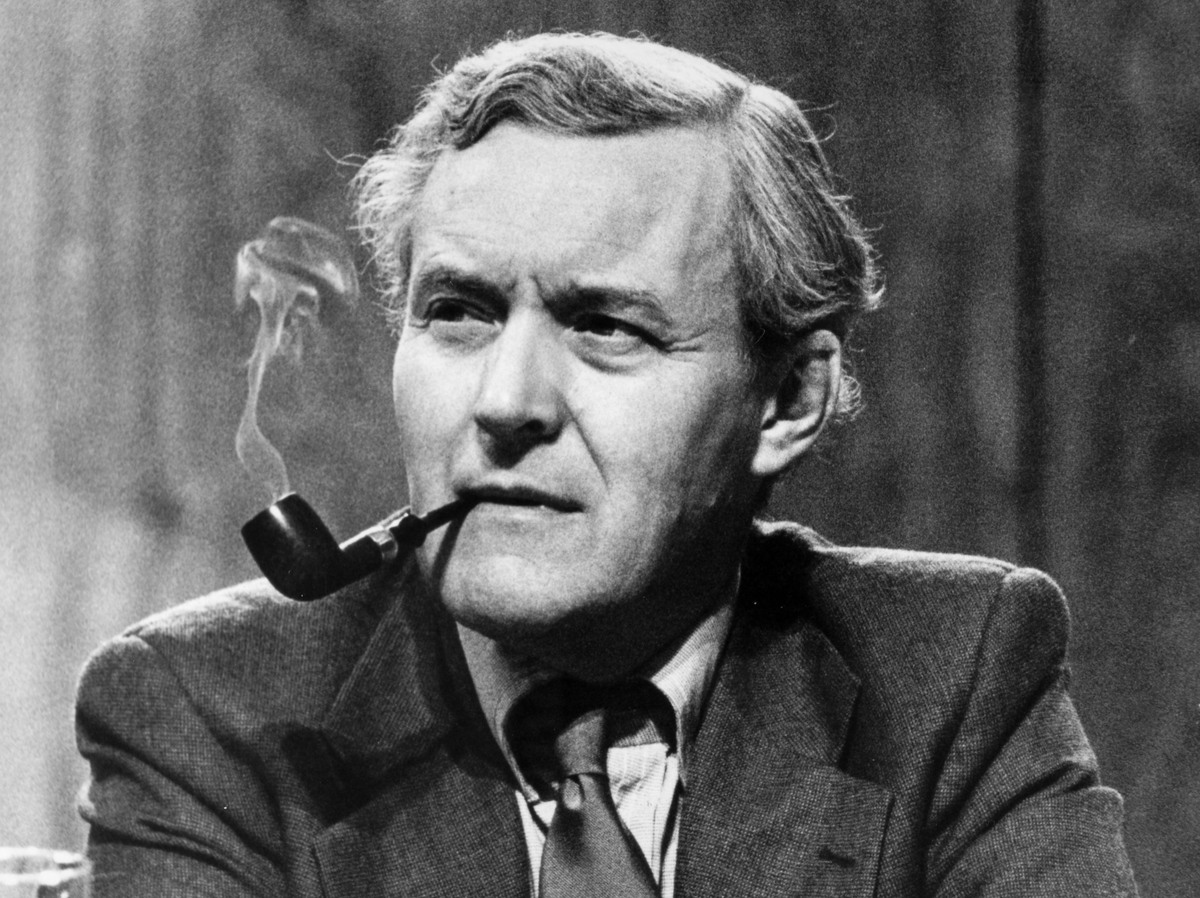
Tony Benn
For some of us, this rethink amounted to more than expedient doctrinal trimming. Encouraging home ownership was really a good idea: why should all property be owned by the rich? But while supporting home ownership, we argued that the government should also build more social housing and enlarge the stock available for rent by low-income families.
But these ideas met stiff resistance in the Labour Party ranks, and not simply from Trotskyist entryists such as Militant. The resistance from Tony Benn and his supporters was substantial and even more enduring. It was clear that old-fashioned socialist ideas still had a tenacious appeal for Labour’s membership.
The Labour Coordinating Committee
The Labour Coordinating Committee (LCC) became one of the primary modernising forces within Labour. Its leadership included Hilary Benn, Cherie Blair, Mike Gapes, Peter Hain, Harriet Harman and others of enduring fame. I was elected to its executive committee. We worked closely with Kinnock and members of his shadow cabinet, including Robin Cook.
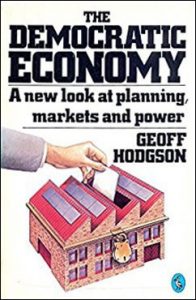 I had written a book entitled The Democratic Economy where I argued that socialists should support a permanent private sector in the economy. The book was published by Penguin in 1984. Another influential work at the time was Alec Nove’s Economics of Feasible Socialism, which also argued for a substantial role for markets.
I had written a book entitled The Democratic Economy where I argued that socialists should support a permanent private sector in the economy. The book was published by Penguin in 1984. Another influential work at the time was Alec Nove’s Economics of Feasible Socialism, which also argued for a substantial role for markets.
On 26 November 1983, at the Labour Coordinating Committee AGM in Birmingham, I proposed that Clause Four of the Labour Party constitution should be rewritten to include an acceptance of a private sector and a role for markets. But I was defeated over the idea that Clause Four should be rewritten. This was out of fear of antagonising the Benn wing. Instead, the LCC resolved that Clause Four should be “clarified”.
But a resolution on long-term aims, which I had helped to draft, was passed by a large majority. The resolution called for the Labour Party to draft a new statement of aims, upholding “that socialism involves extended democracy and real equality. Democracy under socialism is extended to industry and the community … and must involve a substantial decentralisation of power.”
Equality meant the “absence of discrimination on the basis of gender and race, universal freedom from poverty, and a widespread distribution of wealth and power, as well as formal equality under the law and universal suffrage.”
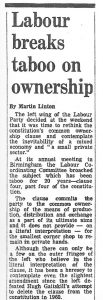 There was a commitment to “political pluralism” and to “economic pluralism” involving “a variety of forms of common ownership … and the toleration of a small private sector including self-employed workers and other private firms.” The economy must be dominated by mechanisms of “democratic planning … but also accommodating a market mechanism in some areas.”
There was a commitment to “political pluralism” and to “economic pluralism” involving “a variety of forms of common ownership … and the toleration of a small private sector including self-employed workers and other private firms.” The economy must be dominated by mechanisms of “democratic planning … but also accommodating a market mechanism in some areas.”
There was also a “commitment to internationalism, disarmament and peace” and “a disengagement from the power blocs” of the West and East.
I think that today Jeremy Corbyn and his followers would accept much or all of this, at least as a temporary stopping-point on the road to full socialism. But in the 1980s there was strong hostility to these revisionist ideas from within Labour’s ranks at the time, including from Corbyn and Tony Benn.
Since then my own views have adjusted. See my Wrong Turnings book. But this blog is not primarily about me. It is about what has happened to the Labour Party and how difficult it is to change its DNA.
For a while, the LCC tried to keep the conversation going on the need to revise Labour’s aims. The Guardian newspaper reported the LCC conference with the headline: “Labour breaks taboo on ownership”.
The LCC held a conference in Liverpool in June 1984 on “The Socialist Vision”. But enthusiasm for this discussion fizzled out. Many leaders of the LCC wanted a political career, and they wished to widen their support on constituency selection committees.
By 1985 the LCC’s revisionist initiative had been kicked into the long grass. My efforts to change Clause Four had failed.
From Kinnock to Blair
But to their credit, Neil Kinnock and his deputy Roy Hattersley saw the need for Labour to modernise its aims. I advised them both for a while. Another election defeat in 1987 spurred a rethink. But by then I had become inactive in the Labour Party.
As Richard Toye has recorded, in 1988 Kinnock and Hattersley presented a new document on “Aims and Values” to Labour’s National Executive Committee. But “it was criticised by John Smith, Bryan Gould and Robin Cook as being too enthusiastic about the benefits of the market, and was watered down accordingly”.

Tony Blair
Clearly, even after a third election defeat there was still strong resistance, from both the “soft” and the “hard left”, to the idea of embracing markets and private property.
After the next election defeat in 1992, Kinnock stood down. He was replaced by John Smith, who died tragically from a heart attack. Then Tony Blair became leader, with a firm resolve to modernize the party. Four election defeats had made the majority of members more receptive to his ideas.
Blair’s Revision of Clause Four
In 1995, after 77 years, Clause Four was changed. Tony Blair successfully ended the Labour Party’s longstanding constitutional commitment to far-reaching common ownership. Tony Benn protested: “Labour’s heart is being cut out”. The new wording of “Clause IV: Aims and Values” began as follows:
“The Labour Party is a democratic socialist party. It believes that by the strength of our common endeavour we achieve more than we achieve alone, so as to create for each of us the means to realise our true potential and for all of us a community in which power, wealth and opportunity are in the hands of the many not the few; where the rights we enjoy reflect the duties we owe and where we live together freely, in a spirit of solidarity, tolerance and respect.”
The 1918 formulation did not use the word socialism – it had common ownership instead. Ironically, Blair introduced the term in 1995. But he attempted to change its meaning. He promoted “social-ism”, which now meant recognizing individuals as socially interdependent. It also signalled social justice, cohesion and equality of opportunity.
The new Clause Four continued, to make a significant statement in support of competiive markets and a private sector. Labour now stood for:
“A DYNAMIC ECONOMY, serving the public interest, in which the enterprise of the market and the rigour of competition are joined with the forces of partnership and co-operation to produce the wealth the nation needs and the opportunity for all to work and prosper with a thriving private sector and high-quality public services …”
The text went on to cover “a just society”, “an open democracy”, “a healthy environment” and “defence and security”.
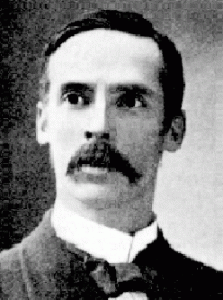
John A Hobson
Labour’s new aims and values were indistinguishable from the earlier views of radical social liberals, such as T. H. Green, J. A. Hobson and David Lloyd George. And with its endorsement of “the rigour of competition” and “a thriving private sector” it was a hundred miles away from the collectivism of Robert Owen and other original socialists.
Instead of tackling the problem of its old collectivist DNA more directly, Blair tried to change the meaning of socialism and even rewrote parts of its own history. It is unsurprising that the old socialist DNA survived. It remained viable, partly because Labour still declared itself as socialist. Blair made radical changes but also gave succour to the traditional socialist wing of the party.
Blair’s popularity within the party had waned even before his decision in 2003 to support George W. Bush’s Iraq War. Much of this disenchantment was due to his abandonment of wholesale common ownership.
Blair had failed to develop a fully-fledged alternative vision within Labour to replace old-fashioned common ownership. He had made Labour implicitly embrace liberalism in doctrine. But this was unspoken, and masked by the explicit insertion of socialism in its aims. This inadvertently played into the hands of the party’s enduring, backward-looking left.
Labour’s Love Lost
Just as Labour had shifted to the left after losing power in 1979, after its 2010 defeat it shifted slightly leftwards under Ed Miliband. But the new leader had no clear alternative to the economics of austerity. So after another defeat in 2015. the party membership took a massive lunge to the left. It elected the Bennite, retro-Marxist, perennial protestor, Jeremy Corbyn.
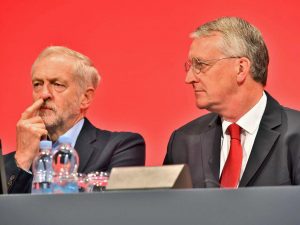 But while old ideas within Labour had survived, the structure of the party and its electoral base had changed enormously in the period from 1983 to 2015. Kinnock had relied on the moderating force of the trade unions, to fight the hard left and move the party toward electability. But by 2015 the unions had been gravely weakened and several had moved toward the hard left.
But while old ideas within Labour had survived, the structure of the party and its electoral base had changed enormously in the period from 1983 to 2015. Kinnock had relied on the moderating force of the trade unions, to fight the hard left and move the party toward electability. But by 2015 the unions had been gravely weakened and several had moved toward the hard left.
In 1983, both the affiliated unions and the Labour MPs had a major role in the election of any new Labour leader. But by 2015 the power was almost entirely in the hands of the Labour Party membership, and the other moderating forces were much diminished.
Labour’s history shows how difficult it has been to change Labour’s old-fashioned socialist DNA. Those that put their faith in a revival of moderation within must take into account the near-collapse of those internal forces that brought the party back to sanity in 1951-1964 and in 1979-1997.
In 1983 there was still a strong, traditional, tribal, Labour vote, part of it based on surviving industries such as coal and steel. By 2015 the working class was much more fragmented, with skilled, aspirational cohorts at one extreme, and uneducated, demoralized, welfare dependents at the other.
The old tribalism was challenged by UKIP and by a revived working class Conservatism, playing the nationalist card. Labour’s potential electoral base has been transformed beyond recognition. The division of labour has become profoundly political, as well as enduringly economic.
Today, there seems little hope for a party that calls itself “Labour”, just as there is no future for a party that retains the word “socialism” or the goal of widespread public ownership. The socialist experiments of the twentieth century testify to their failure. Labour, in short, is an anachronism.
8 May 2017
|
This book elaborates on some of the political issues raised in this blog:
Wrong Turnings: How the Left Got Lost
Published by University of Chicago Press in January 2018
|
References
Attlee, Clement R. (1937) The Labour Party in Perspective (London: Gollancz).
Blair, Tony (1994) Socialism, Fabian Pamphlet 565 (London: Fabian Society).
Clarke, Peter (1978) Liberals and Social Democrats (Cambridge: Cambridge University Press).
Hodgson, Geoffrey M. (1984) The Democratic Economy: A New Look at Planning, Markets and Power (Harmondsworth: Penguin).
Hodgson, Geoffrey M. (2017) Wrong Turnings: How the Left Got Lost (Chicago: University of Chicago Press, forthcoming).
Nove, Alexander (1983) The Economics of Feasible Socialism (London: George Allen and Unwin).
Toye, Richard (2004) ‘The Smallest Party in History’? New Labour in Historical Perspective’, Labour History Review, 69(1), April, pp. 83-104.
Posted in Common ownership, Democracy, Jeremy Corbyn, Karl Marx, Labour Party, Left politics, Liberalism, Markets, Nationalization, Politics, Private enterprise, Property, Robert Owen, Socialism, Tony Benn, Tony Blair, Tony Blair
August 16th, 2016 by geoffhodgson1946
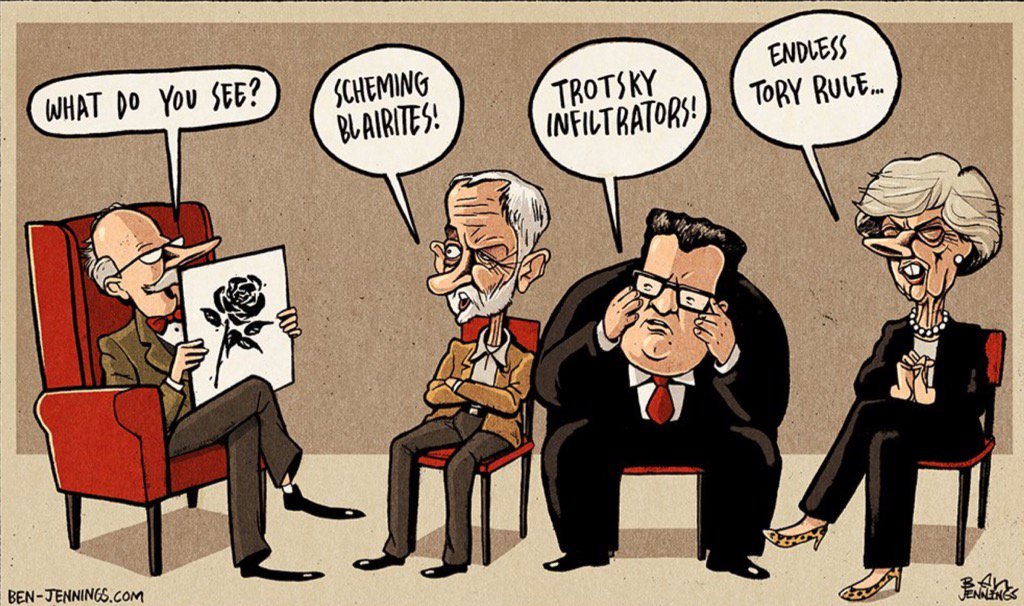
Geoffrey M. Hodgson
“This, from the always measured g. m. hodgson, shows Labour’s existential crisis in horrifying detail” – Susan Wilde
“The revolutionary road: excellent sober distillation of Marxism/Leninism/Trotskyism/socialism; rights v insurrection” – Rich Greenhill
“A very good summary of Labour and Trotskyism” – Gerry Hassan
“Another fantastic article!” – Lily Jayne Summers
John McDonnell, the Labour Shadow Chancellor, is an admirer of Trotsky. Corbyn once called upon the USSR to rehabilitate the Russian revolutionary.2
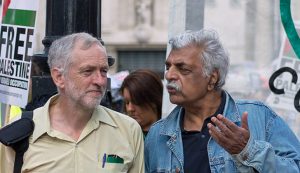 Trotskyists are socialists who believe in the common ownership of the means of production. This goal was stated in Labour’s Clause Four from 1918 to 1995, so why shouldn’t Trotskyists be allowed to join Labour?
Trotskyists are socialists who believe in the common ownership of the means of production. This goal was stated in Labour’s Clause Four from 1918 to 1995, so why shouldn’t Trotskyists be allowed to join Labour?
Trotskyists differ from the devotees of Mao Zedong or Joseph Stalin. Trotskyists do not describe the murderous regimes of Mao’s China and the USSR as socialist. They promote themselves as anti-totalitarian, and they might seem much more democratic than other Marxists.
So why shouldn’t Trotskyists be allowed to join Labour?
The Parliamentary versus the Revolutionary Road
There is a prominent negative answer to this question. It raises profound differences of strategy. As Neil Kinnock (who did the party a great service by kicking out Militant in 1985) said in a speech to the Parliamentary Labour Party in July 2016:
‘In 1918 in the shadow of the Russian revolution [Labour members decided] … that they would not pursue the revolutionary road – it was a real choice in those days. They would pursue the parliamentary road to socialism.’
According to this view, Labour members and revolutionary Marxists share the same aim – socialism – but they differ on the method of getting there. Labour follows the parliamentary road; Marxists choose the revolutionary road.

Robert Owen
There are big problems with a part of this argument. Socialism was defined by Robert Owen and Karl Marx in terms of common ownership of the means of production and ‘the abolition of private property’.
But at least in practice since 1945, Labour has been less and less devoted to this goal. Finally, the goal of ‘common ownership’ was removed from Clause Four of the Labour Party Constitution in 1995.
Labour now says that it is a ‘democratic socialist’ party but defines this not in terms of common ownership. Instead there is a goal of social solidarity, believing ‘that by the strength of our common endeavour we achieve more than we achieve alone’, and in a society ‘in which power, wealth and opportunity are in the hands of the many not the few’.
Arguably, such a goal might be achievable in a reformed capitalism. But Trotskyists, like all Marxists, are emphatically against capitalism.
What Trotskyists and the post-1995 Labour Party Constitution mean by ‘socialism’ are very different. The divergences between Labour and Trotskyists concern different ends, as well as different means.
But Corbyn’s election as Leader by over 59 per cent of the membership in 2015 shows that the traditional definition and goal of socialism in the Labour Party is far from dead and buried. Under Corbyn’s leadership, Labour could return to its pre-1995 goals.

Tony Blair
Ironically, by getting rid of the traditional ‘common ownership’ version of socialism in 1995, but retaining the word ‘socialism’ in an attempt to invest it with a different meaning, Tony Blair provided legitimacy for any later attempt by classical socialists – including currently by Trotskyists and Corbynistas – to restore Labour to its original colours.
Within Labour today, because of this legacy, everyone from Trotskyists and Corbynistas at one extreme, through Owen Smith, Neil Kinnock and then on to Tony Blair at the other extreme, is obliged to call themselves a ‘socialist’. But there are massive silences and huge disagreements on its meaning.
Labour becomes less capable of discussing fundamental differences of goal, but clings onto the illusion of the fundamental goodness of something called ‘socialism’. Labour’s problem of entryism will never go away while the s-word continues to cast its spell. The word itself is an invitation for those who propose the common ownership of anything to join.
The Totalitarian Politics of Class Struggle
There are other fundamental problems with Marxism in general, and Trotskyism in particular. First, Marxism rejects the supreme values of the Enlightenment.
For example, Frederick Engels in Socialism: Utopian and Scientific, saw these Enlightenment values as ‘nothing more than the idealized kingdom of the bourgeoisie’ with its ‘bourgeois justice’, its ‘bourgeois equality before the law’ and ‘bourgeois property … proclaimed as one of the essential rights of man’.
 Marxists do not see the French Revolutionary principles of liberty, equality and fraternity as a potential achievement for all, but the rhetoric of the rising capitalist class in the class struggle against the old feudal order.
Marxists do not see the French Revolutionary principles of liberty, equality and fraternity as a potential achievement for all, but the rhetoric of the rising capitalist class in the class struggle against the old feudal order.
After playing their progressive historic role, Enlightenment ideas are seen as ‘bourgeois’ ideology, which now serves to repress the working class.
Marx saw socialism as the class destiny of the proletariat, which by overthrowing capitalism would emancipate humankind from inequality and exploitation. Socialism was not validated by an appeal to justice or rights. Instead it was grounded on ‘material’ and ‘economic’ developments within capitalism that were leading to growing internal crises and the rise of the proletariat.
Marx rejected all appeals to rights or justice. He bypassed the issues of morality and justice by focusing on the real social forces allegedly leading to socialism. But neither the driving forces of history nor the supposed destiny of a social class make this socialist future just, or morally right.

Karl Marx
By shelving the discourse on rights, in favour of the scientifically-clothed rhetoric of proletarian destiny, all versions of Marxism – including Trotskyism – are on the slippery slope toward totalitarianism.
When rights are no longer universal, and no-one has the protection of an independent legal system, the any action that is deemed ‘counter-revolutionary’ or ‘against the interests of the working class’ gives the accused no effective defence. The prosecutors monopolise the interpretation of guilt. Arbitrary punishment can follow.
The rights of critics and dissenters have to be protected, by their formal recognition and the autonomy of the judiciary. Unless this is done, any criticism can be crushed.
Trotsky was wrong: the roots of totalitarianism do not lie principally in the personalities of brutal, power-hungry individuals such as Stalin, but in Marxism itself. As Leszek Kolakowski suggested:
‘Marx’s anticipation of perfect unity of mankind and his mythology of the historically privileged proletarian consciousness … were responsible for his theory being eventually turned into an ideology of the totalitarian movement: not because he conceived of it in such terms, but because its basic values could hardly be materialized otherwise.’
Violence versus Parliament and Law
Laws get in the way of revolutionary struggle. Hence, along with their dilution of the notion of rights, Lenin proposed that all laws should be abolished.
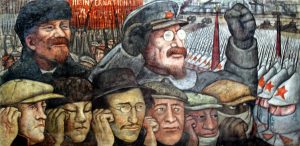 Writing in 1918, Lenin described the desired ‘dictatorship of the proletariat’ as ‘rule based directly upon force and unrestricted by any laws. The revolutionary dictatorship of the proletariat is rule won and maintained by the use of violence by the proletariat against the bourgeoisie, rule that is unrestricted by any laws.’ Trotsky supported Lenin in this and most other respects.
Writing in 1918, Lenin described the desired ‘dictatorship of the proletariat’ as ‘rule based directly upon force and unrestricted by any laws. The revolutionary dictatorship of the proletariat is rule won and maintained by the use of violence by the proletariat against the bourgeoisie, rule that is unrestricted by any laws.’ Trotsky supported Lenin in this and most other respects.
Consequently, a fundamental problem with Marxism is its failure to support the universality of human rights. Human rights apply to all, as in the majestic 1948 United Nations Declaration of Universal Human Rights.
Instead, Marxists see social advancement as a matter of ‘class struggle’ where one class must seize power and remove rights from another class. Lenin and Trotsky went one step further: they argued that this struggle for proletarian power must override the rule of law.
The Second Congress of the Communist International took place in Russia in 1920. Under the leadership of Lenin, one of its resolutions mentioned ‘bourgeois parliaments’ and declared:
‘The task of the proletariat consists in breaking up the bourgeois state machine, destroying it, and with it the parliamentary institutions, be they republican or constitutional monarchy.’
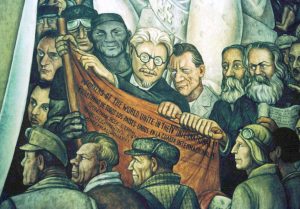 Throughout his life, Trotsky defended the decisions of the first four congresses of the Communist International, which took place when Lenin was alive and before Stalin seized power.
Throughout his life, Trotsky defended the decisions of the first four congresses of the Communist International, which took place when Lenin was alive and before Stalin seized power.
Trotsky added his own idea of ‘permanent revolution’, involving civil war, even in a parliamentary democracy:
‘Socialist construction is conceivable only on the foundation of the class struggle, on a national and international scale. This struggle … must inevitably lead to explosions, that is, internally to civil wars and externally to revolutionary wars. Therein lies the permanent character of the socialist revolution as such, regardless of whether it is a backward country … or an old capitalist country which already has behind it a long epoch of democracy and parliamentarism.’
Conclusion: Hands Tied Behind their Backs
Those in Labour wanting to fight the battle against entryism have two hands tied behind their backs.
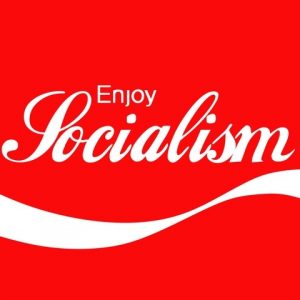 First, by hanging on to the word ‘socialism’, after abandoning its original meaning, it is difficult to exclude those who are more genuinely socialist in the classical sense of common ownership. Labour’s obligatory (but now shallow) rhetoric of ‘socialism’ is a green light for socialist entryists of all kinds.
First, by hanging on to the word ‘socialism’, after abandoning its original meaning, it is difficult to exclude those who are more genuinely socialist in the classical sense of common ownership. Labour’s obligatory (but now shallow) rhetoric of ‘socialism’ is a green light for socialist entryists of all kinds.
Second, Labour has long-ago ditched the politics of class struggle, but it retains a notion of class partisanship in its very name. It was formed historically to represent the interests of the working class. It was built upon the trade union movement. Labour itself is a class party.
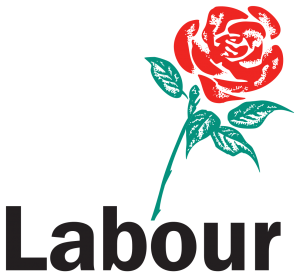 Of course, Labour in practice has put aside the notion that it is speaking for one section of society only. But its name remains a problem, both for broadening its appeal and for barring the more energetic and extreme exponents of working class representation and power.
Of course, Labour in practice has put aside the notion that it is speaking for one section of society only. But its name remains a problem, both for broadening its appeal and for barring the more energetic and extreme exponents of working class representation and power.
Of course, to achieve its goals, Labour is pledged to working through parliament, rather than through revolution. This is a very important difference. Many Marxists are still devoted to insurrection. Labour clearly is not. With this one big foot it can kick back. But its two hands are tied.
Labour still has much outdated baggage to deal with. Even if it staves off Trotskyist entryism – which now seems unlikely, at least while Corbyn is Labour Leader – it still will have a number of big problems. It will need to find and package a new identity for itself, which is suitable for the twenty-first century.
Retaining an unconvincing redefinition of ‘socialism’ and calling itself ‘Labour’ will not do.
Labour needs to come to terms with the fact that both classical socialism and class politics are untenable. It has to put democratic and progressive Enlightenment values at its centre, and reconfigure itself for the challenges of the twenty-first century.
16 August 2016
Minor edits: 17-18 August 2016
Endnotes
- Note that I refrain in this article from estimating the scale or impact of Trotskyist entryism in the Labour Party. They are not central to my argument here. For evidence of both (and of Corbyn’s links with the IRA) see here. At least currently, entryists into Labour are probably few in number, but it is a well-established fact that a few determined people can influence many thousands.
- In 2010, McDonnell attended an event commemorating the 70th anniversary of Trotsky’s assassination and has praised the ‘importance’ of his ideas (Riley-Smith 2016a). In 1988 Corbyn demanded from Parliament that the USSR should ‘give complete rehabilitation to Leon Trotsky’ (Riley-Smith, 2016b). Nothing wrong with that, but its shows the way he leans and who he chooses as friends.
- Personal note: I was a critical and wobbly Trotskyist from 1968 to 1973. I re-joined the Labour Party in 1974 and left it in 2001. The photograph below shows me (not then a Trot) visiting Trotsky’s house in Mexico in 1981, where he was murdered in 1940. It is a moving and impressive place.

References
Crick, Michael (2016) Militant (London: Biteback Publishing), esp. pp. xvii–xviii.
Kolakowski, Leszek (1977) ‘Marxist Roots of Stalinism’, in Robert C. Tucker (ed.) (1977) Stalinism: Essays in Historical Interpretation (New York: Norton), pp. 283-98.
Lenin, Vladimir Ilyich (1967) Selected Works in Three Volumes (London: Lawrence and Wishart), esp. vol. 3, p. 49.
Marx, Karl and Engels, Frederick (1962) Selected Works in Two Volumes (London: Lawrence and Wishart), esp. vol. 2, p. 117.
New Park Publications (1977) The Second Congress of the Communist International, 2 vols (London: New Park), esp. vol. 2, p. 52.
Riley-Smith, Ben (2016a) ‘Labour Entryism Row: John McDonnell Attended Celebration of Leon Trotsky and Praised ‘Importance’ of his Ideas’, The Telegraph, 14 August. http://www.telegraph.co.uk/news/2016/08/14/labour-entryism-row-john-mcdonnell-attended-celebration-of-leon/.
Riley-Smith, Ben (2016b) ‘Jeremy Corbyn Called for a “Complete Rehabilitation” of Leon Trotsky in Parliament’, The Telegraph, 16 August. http://www.telegraph.co.uk/news/2016/08/15/jeremy-corbyn-called-for-complete-rehabilitation-of-leon-trotsky/
Sparrow, Andrew and Jones, Harrison (2016) ‘Secret Recording of Kinnock’s anti-Corbyn Speech to MPs – In Full’, The Guardian, 6 July. http://www.theguardian.com/politics/2016/jul/08/secret-recording-neil-kinnock-jeremy-corbyn-step-down-speech-to-mps-in-full.
Trotsky, Leon D. (1962) The Permanent Revolution and Results and Prospects (London: New Park), esp. ch. 10.
Watson, Tom (2016) ‘Tom Watson Sends Corbyn “Proof of Trotskyist Labour Infiltration”’, The Guardian, 10 August. http://www.theguardian.com/politics/2016/aug/10/tom-watson-sends-corbyn-proof-of-trotskyist-labour-infiltration
Posted in Common ownership, Democracy, Jeremy Corbyn, Labour Party, Left politics, Liberalism, Nationalization, Robert Owen, Socialism, Tony Benn, Tony Blair, Uncategorized
August 10th, 2016 by geoffhodgson1946

Geoffrey M. Hodgson
‘This is a thundering good read’ – Peter Smith
‘The best article I’ve read for a while’ – Karen Bradley
‘Brilliant on why socialism isn’t “obvious”’ – Robbie Hudson
‘Very informative & sobering. Highly recommended’ – Jan Davies
One thing in British politics is very obvious: Jeremy Corbyn and his followers are very keen on something they call socialism. But this word has migrated in meaning since it first appeared in English in 1827. So it is reasonable to ask what they mean by it.
I’ve tried. I got lots of vague answers.
I fully appreciate that the Mirror is an unsuitable forum for a detailed account of the workings of the future socialist utopia, but unfortunately I have little else to go on. Apart from some gestures in favour of nationalization, and some sentimentality for the pre-Blair version of Labour’s Clause Four, I can find no fuller account of what Corbyn’s ‘socialism’ means.
Yet we are told twice (in one short quote) that it is ‘obvious’.
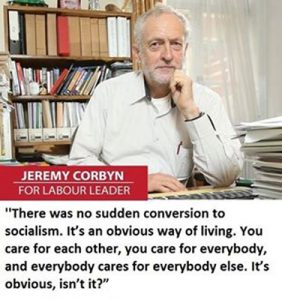 Here is my own confession: fifty years ago I believed that socialism was ‘obvious’. Eventually I was persuaded otherwise. Initially, it was not my growing awareness of the horrendous consequences of the socialist experiments in Russia, China and elsewhere that jolted me.
Here is my own confession: fifty years ago I believed that socialism was ‘obvious’. Eventually I was persuaded otherwise. Initially, it was not my growing awareness of the horrendous consequences of the socialist experiments in Russia, China and elsewhere that jolted me.
My comrades and I saw these deformations as unfortunate results of Stalinist bureaucracy plus Western hostility. We believed that a different, ‘democratic socialism’, was possible.
What persuaded me that socialism is not ‘obvious’ was a consideration of how such a system could work, in detail and in practice. How would production and distribution be organised? How would dispersed information concerning production and distribution be gathered and processed? How would resources be allocated? Who would decide? How would trillions of dispersed decisions be somehow processed by democratic committees? How would less-devoted workers be incentivized or persuaded to work harder or with greater attention to detail? What incentives would exist to encourage innovation and change, especially when everything had to be referred to some democratic council? And so on.
Once you begin to ask these difficult questions, socialism becomes much less ‘obvious’.
Numbers and incentives
Some version of socialism might work on a small scale. Cooperation can work in small groups, based on close, inter-personal interactions. Humans have co-operated in this way, in families and tribal units, for many thousands of years.
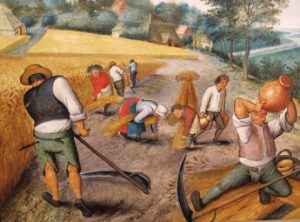 Nobel Laureate Elinor Ostrom studied the management of common-pool resources – such as medieval common land, fisheries or agricultural irrigation schemes – and showed how they can be effectively managed by relatively small local communities.
Nobel Laureate Elinor Ostrom studied the management of common-pool resources – such as medieval common land, fisheries or agricultural irrigation schemes – and showed how they can be effectively managed by relatively small local communities.
Their small size allows participants to monitor each other, to ensure that necessary tasks are carried out and that the interests of the community are served.
Enforcement mechanisms range from praise to punishment. Within these relatively small and cohesive groups, trust and targeted sanctions are mechanisms for encouraging cooperation, reciprocity and compliance with social rules.
But these mechanisms depend on a degree of familiarity with one another. Big problems emerge when we move from tribal to large-scale societies. These began to develop about twelve thousand years ago. Our natural and cultural dispositions to cooperate and to help one another had to be supplemented by other mechanisms.
In larger societies, face-to-face, trust-based mechanisms to sustain cooperation are relatively less effective. When we move from communities of a hundred or so, where it is possible for everyone to know everyone else, to communities of thousands or more, then interpersonal trust and reputation are much less successful with large-scale interactions, and they have to be supplement by other incentives and constraints.

The increase of scale can create incentive problems that can be overcome in smaller communities. Many socialist experiments involved collectivisation. But when thousands of people are brought together, and rewards are shared, then there is less incentive to make the extra effort, because the rewards from that additional work would be hugely diluted.
This problem was illustrated dramatically in China. After the Communist Revolution of 1949, agriculture was organized into large collective farms. Farmers had little incentive to improve productivity, other than by threats and bureaucratic bullying. Risky innovation was unwise. Productivity remained low and often there were shortages of food.
Mao Zedong died in 1976, opening up the possibility of reform. In 1978 some peasant farmers decided to withdraw from collective farms and take responsibility for production at the household level, where the household (instead of the collective) received the revenue from its sold output. Individual households had much greater incentives to work harder and to innovate.
After decades of slow growth under Mao, China’s explosive economic growth began with those changes in rural areas. As a result, unprecedented millions were lifted out of poverty. China’s spectacular economic growth began when agriculture began to pass into the private control of the peasants after 1978.
|
This book by G. M. Hodgson elaborates on some of the political issues raised in this blog:
Wrong Turnings: How the Left Got Lost
Published by University of Chicago Press in January 2018
|
While interpersonal interactions can engender cooperation on a small scale, and they continue to do so in families and small communities, in large-scale societies other mechanisms and incentives are necessary. Economic history teaches us that modern dynamic economies depend on markets, competition and a large private sector, as well as an effective state.
 Corbyn is right: it is very important that we care for one another. But in terms of practical input, we cannot care equally for everyone. We can care more readily for those close to us, who we know well: our family, our friends and our workmates. But extending our caring to society as a whole becomes more of a political and less of a personal project. We need caring governments, but the practical extension of caring from the personal to the political is neither obvious nor easy.
Corbyn is right: it is very important that we care for one another. But in terms of practical input, we cannot care equally for everyone. We can care more readily for those close to us, who we know well: our family, our friends and our workmates. But extending our caring to society as a whole becomes more of a political and less of a personal project. We need caring governments, but the practical extension of caring from the personal to the political is neither obvious nor easy.
The need for countervailing power
A simplistic response would be to suggest that we elect a government that is staffed by well-meaning individuals. But to different degrees, almost everyone is corruptible. Even the uncorrupt have their own biased agendas and priorities.
 There is a need for rules, monitoring and countervailing power. If all economic power is concentrated in the bureaucracy of planners, then will be no effective alternative power that can countervail.
There is a need for rules, monitoring and countervailing power. If all economic power is concentrated in the bureaucracy of planners, then will be no effective alternative power that can countervail.
Even if politicians are competent and well meaning – lots of them are – they still face the problems of dispersed knowledge and uncertainty in modern, large-scale, and highly complex economies.
Consequently, relatively little can be planned from the top. Solutions to real-world, nitty-gritty problems are rarely ‘obvious’. There is a need for both humility and experimentation. We need to try and see what works and learn from mistakes, rather that rushing headlong towards what seems obvious.
The survival of democracy depends on a dispersion of real economic and political power. A healthy, pluralist polity depends on a pluralist economy, with multiple centres of autonomous decision-making. This means a system of private enterprise, as well as a political system with checks, balances and power that can be held to account. The state can and must also play a vital role in the economy, but not to the extent that it smothers private enterprise and initiative.
There is a large and fascinating analytical literature on the problems involved in classical socialism, and I cite a few works on this below. There is not the space to go into it further here. These works are not all written by neoliberals. But intelligent neoliberals – despite their limitations – are often worth reading. Although there are disagreements on approach and detail, the general conclusion is that large-scale socialism cannot work effectively and democratically. This analytical conclusion is corroborated by the historical experience of stagnation in innovation in Soviet-style regimes.1
The ‘obvious’ roots of fanaticism and intolerance
The ‘obviousness’ of socialism empowers its supporters with enduring energy and even fanaticism. If socialism is ‘obvious’, how do we explain the failure of other intelligent people to get on board? If they are not stupid, then they must be acting out of personal malice or greed. They must have sold out their principles in some way. Or they are just plain nasty. When socialism is seen as ‘obvious’, its opponents are regarded as stupid or evil.
The perceived ‘obviousness’ of socialism fuels both fanaticism and intolerance. Because the solution to the problem is ‘obvious’, there can be no doubt. There is no need to experiment, to seek wise counsel, or to listen to critics. Those that deny the obvious are deluded, corrupted, or in the pay of those that gain from the existing system.
 The great American politician Robert F. Kennedy once said:
The great American politician Robert F. Kennedy once said:
‘What is objectionable, what is dangerous about extremists is not that they are extreme, but that they are intolerant. The evil is not what they say about their cause, but what they say about their opponents.’
We have seen this elsewhere, in the brutal fanaticism of religious zealots, as well as in the murderous tragedies of twentieth-century socialism under Stalin and Mao. They all shared in common the absence of doubt, the certainty of redemption or victory, and the confidence in their own righteousness.
It is deeply saddening that the once-great British Labour Party has been taken over by people who think that their aims and long-term solutions are ‘obvious’. Once the zealots take over, there is no way back. The party is then trapped in a vicious circle.
A diminished vote in an election is a success because it is seen as a big vote for a purer socialism. When Labour lost the 1983 election on a socialist manifesto, with the lowest share of the vote since 1918, Tony Benn greeted the result as a triumph for socialist ideas.
 Even small successes – such as winning elections to parish councils – feed frenzies of celebration. All acknowledged failures are blamed on others, such as the ‘mainstream media’ or the ‘traitors’ within.
Even small successes – such as winning elections to parish councils – feed frenzies of celebration. All acknowledged failures are blamed on others, such as the ‘mainstream media’ or the ‘traitors’ within.
With an ideology where no possible event can falsify the ‘obvious’, the doubters are purged. The wise give up. The fanatics win.2
Touting socialism as an ‘obvious’ solution empowers a fanaticism that can crush all traces of liberal tolerance, which is essential for democracy within any political party, as well as within the political system as a whole. Corbyn’s victory in the 2016 leadership election marks the point of no return for Labour. It is beyond the beginning of the end. Labour is now dying. Thoughtful radicals must go elsewhere.
10 August 2016
Minor edits – 11-13 August 2016
A version of this post was published in the i newspaper on 11 August.
More comments on this post:
‘A gloomy but sadly very acute and perceptive analysis’ – Helen Salmon
‘Definitely one of his best, and the best thing I’ve read all week’ – Tom Atkinson
‘Excellent article on the anti-democratic nature of seeing one’s views as “obvious”’ – Francis Hoar
‘Brilliant piece on why “obvious” socialism leads to intolerance (and doesn’t work either)’ – Colin Talbot
‘Thank you so much for your still small voice of reason: it is worth its weight in gold amid this chaos’ – Elizabeth Jones
End Notes
- A recent contribution of mine on the socialist calculation debate can be found here.
- After publication, Colin Williams kindly pointed out that the Russell quote that heads this post – although widely attributed to him and close to other similar quotes by Russell – cannot be found in this exact form in Russell’s works.
Bibliography
Hayek, Friedrich A. (1944) The Road to Serfdom (London: George Routledge).
Hodgson, Geoffrey M. (2015) Conceptualizing Capitalism: Institutions, Evolution, Future (Chicago: University of Chicago Press).
Lavoie, Donald (1985) Rivalry and Central Planning: The Socialist Calculation Debate Reconsidered (Cambridge: Cambridge University Press).
Mill, John Stuart (1859) On Liberty (London: John Parker & Son).
Nove, Alexander (1991) The Economics of Feasible Socialism Revisited (London: George Allen and Unwin).
Ostrom, Elinor (1990) Governing the Commons: The Evolution of Institutions for Collective Action (Cambridge: Cambridge University Press).
Steele, David Ramsay (1992) From Marx to Mises: Post-Capitalist Society and the Challenge of Economic Calculation (La Salle, Illinois: Open Court).
Zhou, Kate Xiao (1996) How the Farmers Changed China (Boulder, CO: Westview Press).
Posted in Common ownership, Democracy, Jeremy Corbyn, Labour Party, Left politics, Liberalism, Markets, Politics, Private enterprise, Socialism, Tony Benn
July 10th, 2016 by geoffhodgson1946

“A thoughtful analysis of Labour’s current impasse – back to 1918 in more senses than one”
Niamh Hardiman, Professor of Political Science and Public Policy, University College Dublin
Geoffrey M. Hodgson
Tony Blair and Jeremy Corbyn have been pulling Labour in different directions for decades. But under the surface there are some common roots in their thinking. Also Blair created some of the circumstances in which Corbyn was decisively elected as Labour Party Leader in 2015, with 59.5 per cent of the vote.
Both Blair and Corbyn have enjoyed huge support among Labour members. How could this radical transformation of political opinion take place within a large political party, in the space of less than 20 years?
To answer this question we must first briefly examine how Labour evolved from 1945 to 1979, as a mass party based on strong trade unions. Then came the earthquake of Margaret Thatcher’s election victory in 1979. Labour was defeated in three subsequent elections, before Tony Blair led Labour into power for thirteen years. Blair had help to make Labour electable by combining a reforming momentum with a pro-business image, but he did not provide an adequate political philosophy to replace traditional socialism.
This vacuum, combined with the disastrous invasion of Iraq in 2003, and Labour’s part in the financial crash of 2008, created the conditions for the election of Jeremy Corbyn as leader in 2015. Corbyn turned Labour’s ideological clock back by over half a century and lost its prospect of electability.
Post-War Labour: The Broad Church
After the first majority Labour government was elected in 1945, Labour party individual membership was rising rapidly towards one million and trade union membership began a long upward trend, rising from about 8 million in 1945 to 13 million in 1979. In general elections from 1945 to 1979 inclusive, Labour always polled between 36 per cent and 49 per cent of the vote. Labour was a mass party, built on the pillars of organised individual membership, powerful trade union support, a strong presence in parliament, and the loyalty of over a third of the electorate.

Clement Attlee
Labour’s commitment to widespread common ownership was enshrined in Clause Four of its constitution, which had been adopted in 1918. Before he became Prime Minister in 1945, Clement Attlee had expressed his support for this full-blooded socialist vision of a planned economy with widespread public ownership. But the practicalities of government, and the outbreak of the Cold War in 1948, pushed Labour leaders and intellectuals towards social democracy and a mixed economy. The most important statement of this shift was Anthony Crosland’s The Future of Socialism in 1956.
But, despite the efforts of Hugh Gaitskell and others, Labour’s Clause Four remained unchanged. Labour contained both classical socialist and social-democratic currents. But the socialist wing never achieved supremacy, largely because it had insufficient support among the trade unions that were affiliated to the party. The great union flywheel kept Labour on a social-democratic course. The first-past-the-post electoral system made a party split and a socialist breakaway unviable.
The Thatcher Era: From Multiple Defeats to Recovery
The 1979 defeat of the Labour Government under James Callaghan brought Margaret Thatcher to power and an ensuing 18 years of Tory rule. At first, in reaction to this defeat, the traditional socialist wing of the party made gains under the leadership of Tony Benn. In 1980, Michael Foot, a radical social democrat, was elected as party leader. In 1981, Dennis Healey narrowly defeated Benn for the Deputy Leadership. In frustration with Labour’s shift to the Left and the use of union block votes, a sizeable portion split off to form the Social Democratic Party.
Labour’s 1983 general election manifesto prescribed a good dose of nationalisation, an interventionist industrial policy, unilateral nuclear disarmament, higher personal taxation and withdrawal from the European Economic Community (now the European Union). Tested at the polls, Labour’s vote slumped below 28 per cent, for the first time since 1918.

Neil Kinnock
Then Foot resigned. Neil Kinnock was elected as leader, beginning the long process of making Labour electable once again. Kinnock fought the Marxist entryists in the party, modernised its policies on vital issues such as home ownership, and made it more credible.
Meanwhile, Thatcher continued her assault on Labour’s trade union base. A series of restrictive laws reduced trade union powers. By the time that Labour regained power in 1997, trade union membership had been reduced by more than a third. Today, trade union membership is less than half what it was in 1979, notwithstanding a bigger workforce.
The Blair Revolution: From Socialism to Undeclared Liberalism
The long period in opposition from 1979 to 1997 convinced a majority of Labour members that principle was impotent without power, and that some compromises were necessary to make Labour electable. In this climate, Tony Blair was elected as party leader in 1994.
The term ‘New Labour’ separated the party from its previous electoral baggage, including its original primary focus on common ownership and its antagonism to private business. Blair argued that previous socialists had confused means with ends. The desired end was a society in which all individuals would be valued and had the means of self-fulfilment. If common ownership had been a means that end in the past, then it was no longer appropriate for the modern, complex, global economy.

Tony Benn
In 1995 Blair successfully removed Labour’s commitment to ‘common ownership’ from Clause Four of its constitution. But from the Left, Tony Benn protested: ‘Labour’s heart is being cut out’. In a sense Benn was right, common ownership had been Labour’s core principle since 1918, even if no leader since 1945 had made it a primary goal.
Blair hyphenated the word as ‘social-ism’ and attempted to change its meaning. It now meant a recognition of individuals as socially interdependent, the promotion of social justice and of equality of opportunity, recognising the equal worth of each citizen. He also used the term ‘third way’ to describe a path that differed from widespread collectivisation, on the one hand, and unrestrained markets, on the other.
While Blair saw a sizable role for the market, he was not a ‘neoliberal’ or a free-market libertarian. The state was still to play a major role in the economy. But redistributive taxation and the reduction of inequality were not major priorities. Blair’s close ally Peter Mandelson declared in 1998 that the Labour Government was ‘intensely relaxed about people getting filthy rich as long as they pay their taxes’.

Thomas Paine
While Blair redefined and retained the word social-ism, he moved Labour closer to a version of social liberalism. There is a radical tradition of social liberalism, but it is not socialist in the sense of widespread common ownership. The good of the community is seen as harmonious with the freedom of the individual. This tradition stretches from Thomas Paine through John Stuart Mill to Thomas H. Green, John A. Hobson and others.
From Paine onwards, social liberals raised concerns about inequalities of wealth and power. They appreciated the complexity of decision-making and the potential fallibility of government. Hence they advocated flexibility: there was a need for policy experiments and ongoing appraisals. Institutional checks and balances were required. But for Blair it was all about ‘values’, not structures or institutions.
Labour’s nostalgic devotion to the word socialism was too strong. With or without the hyphen, social-ism had become a zombie-term – a mere badge of identity. Labour was still stuck in its old rhetoric and unable to learn much from the broad liberal tradition.
Blairism as Marxism turned Upside-Down
The relationship between means and ends is important. Marxism famously separates ends from means, claiming that ‘the ends justify the means’. For Marxism, all means are evaluated solely in terms of the ends that they are deemed to serve. But in a complex world, we cannot be sure that specific means will lead to their assumed ends. Hence, contrary to Marxism, means must be placed under moral constraints as well.

Karl Marx
Blair argued that the emphasis on common ownership or nationalization confused means with ends. The ends of social harmony and social justice, for example, might be achieved by means other than common ownership. Ironically, by separating means and ends so completely, Blair mirrored Marxism. Blair used a Marx-like separation of ends from means to abandon classical socialist aims.
But means and ends cannot be completely separated. The American philosopher John Dewey pointed out that the pursuit of goal is itself a learning process that can modify our ends. Furthermore, the use of particular means might modify our ends, as we discover unforeseen problems or benefits. Furthermore, the end we uphold is a spur to action, hence also a means of energizing change. Dewey wrote: ‘there is no end which is not in turn a means’.
Blair adopted another dichotomy from Marxism. This is the separation of the sphere of ‘values and beliefs’ from economic structures and patterns of ownership. This is redolent of Marx’s distinction between the ideological ‘superstructure’ and the ‘economic base’. But Blair reversed their importance: for him ‘values and beliefs’ assumed primacy. Adopting the same dichotomy, Marxism was turned upside-down.
This Marxist dichotomy is false. All economic activity involves beliefs, evaluations and value-laden motivations. Values and beliefs are intrinsic to the economy. The economy is not a machine that can be considered separately from the knowledge, beliefs and expectations of the human agents within it.
Blair in Power: From Achievement to Catastrophe
Blair’s highly charismatic and effective leadership led to the electoral landslide of 1997. Labour’s share of the vote jumped from 34.4 per cent in 1992 to 43.2 per cent in 1997. Especially in the early years, his government achieved a great deal. Education and the National Health Service benefitted for large increases in spending.
One of the first major achievements of Blair’s government was the Good Friday Peace Agreement in Northern Ireland. A minimum wage was introduced and devolved assemblies were set up in Scotland and Wales. The Human Rights Act was passed in 1998, but the Blair government was later accused of complicity in human rights abuses abroad. There was important legislation in pursuit of gay rights. Child and pensioner poverty were dramatically reduced. There was continuous economic growth. Many more people were brought into employment.
Blair won another landslide election in 2001. Demonstrably, by a wide margin, he had made Labour electable, after the wilderness of the Thatcher era. But he did not offer Labour a new philosophy or a robust architecture, after the abandonment of traditional socialism and the decline of its trade union base. Even before Iraq, some of his new policies were challengeable.
 For example, Blair’s emphasis on ‘values and beliefs’ over institutional structures allowed him to privatize some public services, including parts of the National Health Service. His claim was that the same esteemed values could endure within any system of ownership. But changes to institutional structures affect the habits and beliefs of those involved. Extending the scope for contracts and markets means – rightly or wrongly – that pecuniary and profit-orientated values can become more pervasive, unless checks are put in place.
For example, Blair’s emphasis on ‘values and beliefs’ over institutional structures allowed him to privatize some public services, including parts of the National Health Service. His claim was that the same esteemed values could endure within any system of ownership. But changes to institutional structures affect the habits and beliefs of those involved. Extending the scope for contracts and markets means – rightly or wrongly – that pecuniary and profit-orientated values can become more pervasive, unless checks are put in place.
Consistent with his emphasis on ‘values and beliefs’, Blair promoted a programme of expansion of publicly-funded faith schools. But religious faiths are not simply ‘values’: they are organised enclaves of group self-protection and survival. As already evident from the long experience of segregation in Northern Ireland, institutionalised separation can exacerbate political, ethnic and cultural divisions.
A 2001 report commissioned by Bradford City Council concluded that its communities were becoming increasingly isolated along racial, cultural and religious lines, and that faith-segregated schools were fuelling the divisions. Major riots erupted that year in Bradford and other northern cities.
 David Bell – the then Chief Inspector of Schools – warned in a January 2005 speech to the Hansard Society that a traditional Islamic education did not equip Muslim children for living in modern Britain. He said: ‘I worry that many young people are being educated in faith-based schools, with little appreciation of their wider responsibilities and obligations to British society.’ In another lecture Bell said: ‘We can choose … whether we want to bring our diversity together in a single rainbow or whether we allow our differences to fester into separate cultures and separate communities.’ Yet, even after the July 2005 London bombings by home-grown Islamic extremists, and until his resignation from office in 2007, Prime Minister Blair continued to promote faith schools.1
David Bell – the then Chief Inspector of Schools – warned in a January 2005 speech to the Hansard Society that a traditional Islamic education did not equip Muslim children for living in modern Britain. He said: ‘I worry that many young people are being educated in faith-based schools, with little appreciation of their wider responsibilities and obligations to British society.’ In another lecture Bell said: ‘We can choose … whether we want to bring our diversity together in a single rainbow or whether we allow our differences to fester into separate cultures and separate communities.’ Yet, even after the July 2005 London bombings by home-grown Islamic extremists, and until his resignation from office in 2007, Prime Minister Blair continued to promote faith schools.1
Blair’s government reduced the number of heredity peers in the House of Lords, but dithered on further reform. Whether the House of Lords should be fully appointed, fully elected, or be subject to a combination of the two remained under dispute. Blair worried that the House of Lords might impair the will of the Commons – institutionalised checks and balances were not central to his thinking.
Then there was the catastrophe of the 2003 invasion of Iraq. Blair was over-confident that his ‘values’ could prevail, and President George W. Bush could be persuaded to seek United Nations approval. But these ‘values’ were no match for a belligerent Republican Party.
Of dubious legality, this bloody disaster wrecked Blair’s political career. Deadly strife in Iraq continues to this day, with enduring political reverberations in the UK.
 Blair’s motivation for his decision to support Bush’s invasion will be the subject of many biographies and histories to come. The explanation is bound to be complex, but I guess that Blair’s supreme emphasis on ‘values’ over legalities, structures, evidence, fallibilities and practicalities will be uppermost. How else could someone believe in the possibility that Western democratic ideals could quickly take hold in an artificially-created country with no democratic history, riven by ethnic and religious division and fragmented into countless clans?
Blair’s motivation for his decision to support Bush’s invasion will be the subject of many biographies and histories to come. The explanation is bound to be complex, but I guess that Blair’s supreme emphasis on ‘values’ over legalities, structures, evidence, fallibilities and practicalities will be uppermost. How else could someone believe in the possibility that Western democratic ideals could quickly take hold in an artificially-created country with no democratic history, riven by ethnic and religious division and fragmented into countless clans?
Blair was an outstanding politician: he restored Labour’s electability and won three major victories in succession. But when he stepped down from office in 2007 he left an ideological as well as a charismatic vacuum. Labour retained the term socialism, but in substance Blair moved Labour toward an untutored version of reforming liberalism. Largely because of the damage to Blair’s reputation after Iraq, the party was unable to digest this ideological shift.
Blair compounded a problem faced by social democratic parties throughout the world. To a large extent they have lost their way, lacking a well-developed ideology with related, viable goals.
The Corbyn Restoration: Marxism-Leninism Revived
After Blair’s exit, the theoretical, ideological and charismatic void helps to explain why the Labour Party eventually choose the retro-Marxist Jeremy Corbyn as its leader.2 Furthermore, the weakened trade unions were no longer a moderating force: the flywheel had been dismantled. Constitutional changes had given them less power within Labour’s structure and the power they retained had been moved by internal changes to the Left.
The financial crash of 2008 undermined Labour’s reputation for sound finance. When Gordon Brown was Labour Chancellor under Blair, he promoted significant deregulation of the financial sector. After the debt bubble burst, and Western capitalism teetered on the edge of collapse, there was a widespread resurgence of Marxist thinking.
Corbyn turned the clock back, returning to socialism in its original meaning. The goal of common ownership was restored. His semi-Marxist, Bennite socialism was combined with a quasi-Leninist foreign policy. Opposed to the invasions of Afghanistan and Iraq, and to the oppressive treatment of Palestinians by Israel, Corbyn’s foreign policy became systematically anti-West. Corbyn turned Marxism the right way up.
 As if oblivious to the enormous changes in world capitalism, Corbyn clings to an ideology made in 1918. There is neither strategy, detail nor appraisal of feasibilty, to his thinking. All that is left is his ‘values’: his outrage and protest against forces from the West that inflict suffering on the world. There is no mention of the many millions that have died under regimes that were ‘Marxist-Leninist’ by name.
As if oblivious to the enormous changes in world capitalism, Corbyn clings to an ideology made in 1918. There is neither strategy, detail nor appraisal of feasibilty, to his thinking. All that is left is his ‘values’: his outrage and protest against forces from the West that inflict suffering on the world. There is no mention of the many millions that have died under regimes that were ‘Marxist-Leninist’ by name.
Although very different from Blair’s, Corbyn’s ideology faces the same problem of dealing with the potential fallibility of all decisions and policies. Both Blair and Corbyn proceeded as if they had the uncontroversial right answer to any problem. Yet the complexity of the modern world underlines the need for an experimental approach to policy, and for countervailing institutional structures to appraise every move.
Unlike Blair, Corbyn believes that these problems can be solved by large doses of democracy and popular involvement. But he overlooks the problems and dangers of undetailed ultra-democracy. Widespread democratic involvement in the myriad of intricate decisions in a complex politico-economic system is unworkable.
While Blair after 2003 carried the scars of Iraq, Corbyn is on record in his support for terrorist organisations such as Hamas, Hezbollah and the IRA. He has claimed that he was engaging in the peace processes in these theatres of combat. But there was no visible negotiation with the other sides in these conflicts. Corbyn has also given speeches supporting Colonel Muammar Gaddaffi’s regime in Libya and Slobodan Milosevic, the butcher of Bosnian Muslims. Corbyn’s behaviour was more consistent with an ‘anti-imperialist’ and anti-West Leninist than with a broker for peace.
In 1918, Labour first established individual party membership and the ‘common ownership’ Clause Four was first placed in its constitution. Corbyn’s Leninism would take us back to the year after Lenin and the Bolsheviks seized power in Russia. Momentum yes – but backwards in time. Over a hundred years of hard work by millions of activists, building Labour as a political movement and as a party of government, will be reversed.
Corbyn’s political brew has little chance of success. But we should understand the unwitting role of Blair in helping to prepare the ground for its ascendancy within the Labour machine.
Conclusion: Beginning Again
Values are important, but we need more than that. While conservatives can nod in favour of the status quo, radicals must offer a distinctive vision for change – they have to outline the kind of future they want. A movement to change the world must uphold its aims and recruit to its cause.
Changed under Blair’s leadership, the current Labour Party Constitution outlines commendable principles such as by ‘common endeavour we achieve more than we achieve alone’. It laudably aims for a society where ‘power, wealth and opportunity are in the hands of the many not the few’ and ‘where we live together freely, in a spirit of solidarity, tolerance and respect’.
But these words are too vague to provide a clear goal. They are consistent with a range of idealistic plans, from statist socialism to egalitarian ‘people’s capitalism’.
The current Clause Four Part One is silent on the question of property, whether it is to be private or owned in common. Reference to ‘a thriving private sector’ is tucked away in Part Two, alongside a mention of public ownership or accountability where ‘essential to the common good’.
This unmotivated melange satisfies neither traditional socialists who see common ownership as a vital goal, nor liberals who regard some private ownership as one of the preconditions of human freedom. Clause Four is inaudible on these vital institutional questions. ‘Values’ fill the vacuum instead.
Clause Four commendably promotes democracy and human rights, but is unclear about the institutional and politico-economic conditions under which they are nurtured. It does not acknowledge one of the major lessons of the twentieth century, that human rights and traditional socialism have never co-existed, and there are good reasons to conclude that they never will.
The institutional aims of the Labour Party are unclear. There is now a battle for the stricken party’s soul. It will be fought out between traditional socialists and social-democratic modernisers. But it will be a fight over an organisation that has already lost its direction and has no clear way forward. Both Blair and Corbyn bear some responsibility for this crisis.
10 July 2016
Amended: 11-13 July 2016, 18 February 2019.
1 Like Blair, Corbyn also supports faith schools (at least Jewish ones).
2 Pressed by Andrew Marr in July 2015 on whether he was a Marxist, Corbyn ducked the opportunity to deny on television that he held to that view.
Bibliography
Attlee, Clement R. (1937) The Labour Party in Perspective (London: Gollancz).
Bell, David (2005) ‘Full Text of David Bell’s Speech’, The Guardian, 17 January. http://www.theguardian.com/education/2005/jan/17/faithschools.schools
Blair, Tony (1994) Socialism, Fabian Pamphlet 565 (London: Fabian Society).
Bloodworth, James (2015a) ‘A Left-Wing Case against Comrade Jeremy Corbyn’, International Business Times, 4 August. http://www.ibtimes.co.uk/james-bloodworth-left-wing-case-against-comrade-jeremy-corbyn-1513969
Bloodworth, James (2015b) ‘Why is No One Asking About Jeremy Corbyn’s worrying connections?’ The Guardian, 13 August. https://www.theguardian.com/commentisfree/2015/aug/13/jeremy-corbyn-labour-leadership-foreign-policy-antisemitism
Bloodworth, James (2015c) ‘The Bizarre World of Jeremy Corbyn and Stop the War’, Politico, 12 November. http://www.politico.eu/article/bizarre-world-of-jeremy-corbyn-and-stop-the-war-coalition-galloway-rees-iraq-far-left/
Boffey, Daniel (2016a) ‘Hilary Benn Seeks Shadow Cabinet Backing to Oust Corbyn’, The Guardian, 23 June. http://www.theguardian.com/politics/2016/jun/25/hilary-benn-jeremy-corbyn-labour-leadership-eu-referendum-brexit
Boffey, Daniel (2016b) ‘Jeremy Corbyn aides refuse Tom Watson one-on-one meeting’, The Guardian, 3 July. http://www.theguardian.com/politics/2016/jul/02/corbyn-keeps-watson-arms-length
Crosland, C. Anthony R. (1956) The Future of Socialism (London: Jonathan Cape).
Dewey, John (1922) Human Nature and Conduct: An Introduction to Social Psychology (New York: Holt).
Gillard, Derek (2007) Never Mind the Evidence: Blair’s Obsession with Faith Schools www.educationengland.org.uk/articles/26blairfaith.html.
Lukes, Steven (1985) Marxism and Morality (Oxford: Oxford University Press).
Rentoul, John (1995) ‘“Defining Moment” as Blair wins Backing for Clause IV’, The Independent, 27 April. http://www.independent.co.uk/news/defining-moment-as-blair-wins-backing-for-clause-iv-1611135.html
Trotsky, Leon D., Dewey, John and Novak, George (1979) Their Morals and Ours: Marxist versus Liberal Views on Morality (New York: Pathfinder Press).
Posted in Common ownership, Democracy, Jeremy Corbyn, Labour Party, Left politics, Nationalization, Politics, Socialism, Tony Benn, Tony Blair, Tony Blair
May 22nd, 2016 by geoffhodgson1946
Geoffrey M. Hodgson
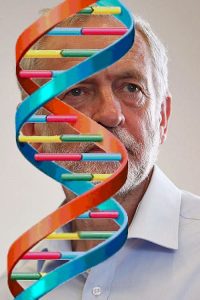 In September 2015 a rank outsider, with minimal support from inside the Parliamentary Party, became Labour Party Leader. But he was elected with the support of almost 60% of the party membership.
In September 2015 a rank outsider, with minimal support from inside the Parliamentary Party, became Labour Party Leader. But he was elected with the support of almost 60% of the party membership.
Jeremy Corbyn first became a Member of Parliament in 1983 and was frequently in opposition to the leadership of his own party. His elevation to Leader in 2015 was widely regarded as a radical break from Labour’s past, particularly from the era of Tony Blair’s leadership from 1994 to 2007.
In contrast to a widespread view, I argue here that Corbyn’s politics are – in most respects – more mainstream than reported. They are broadly in line with the original Labour Party, from its formation in 1900 (as the Labour Representation Committee) to at least 1945.
By contrast, from the election of the first majority Labour government in 1945 to the resignation of Ed Miliband from the leadership in 2015, Labour adjusted to the realities of gaining and retaining power, and became more moderate in much of its political rhetoric. A large section of the party abandoned its original socialist ideology, in substance if not in name, and these pragmatists dominated Labour during the post-war period. To retain credibility, they tried to alter the meaning of socialism to serve more moderate ends.
Corbyn’s election as leader should be understood – in part – as a rehabilitation of typical Labour doctrines of the 1900-1945 period, and of Labour’s aspiration for socialism as originally defined. Corbyn has Labour’s DNA. But he has recombined Labour’s original DNA with ‘anti-imperialist’ doctrines that became prominent, largely outside Labour, in the 1960s and 1970s.
I first summarise Labour Party ideology in the 1900-1945 period. I then show how Corbyn exhibits these earlier views, but in genetic recombination with an “anti-imperialist” politics of the 1960s and 1970s. I then briefly draw some tentative conclusions from this analysis.
Socialism and the Labour Party
The word socialism first appeared in English in 1827 in the Co-operative Magazine, published in London by followers of Robert Owen. It was used in the Poor Man’s Guardian in 1833, and moved into wider usage thereafter.

Robert Owen
For Owen and his followers, socialism meant the abolition of private property. As Owen argued in 1840, ‘virtue and happiness could never be attained’ in ‘any system in which private property was admitted’. He aimed to secure ‘an equality of wealth and rank, by merging all private into public property’.
From the 1830s until the 1950s, socialism was almost universally defined in terms of the abolition of private property and some form of widespread common ownership.
In the Communist Manifesto of 1848, Marx and Engels echoed Owen and others and called for the ‘abolition of private property.’ In 1850 Marx declared: ‘Our concern cannot simply be to modify private property, but to abolish it’. In the Communist Manifesto and elsewhere, he and Engels proclaimed an economic order in which ‘capital is converted into common property, into the property of all members of society.’ They wanted the complete abolition of the ‘free selling and buying’ of commodities.
They welcomed efforts ‘to centralize all instruments of production in the hands of the state’ and looked forward to a time when ‘all production has been concentrated in the hands of a vast association of the whole nation’. Their version of socialism was particularly centralist, but they reflected the views of all socialists in looking for universal common ownership.
Marxism was never a major influence in the British Labour Party. But its founders took on board this same definition of socialism. Socialism was widely understood as the abolition of private ownership and its replacement by some form of common ownership.

Beatrice & Sidney Webb
Fabian socialists such as Sidney and Beatrice Webb had an ultimate vision of a fully planned and consciously controlled socialist economy where all markets and private ownership of the means of production were gradually marginalized to insignificance. They wanted private ownership of the means of production to be ended: it was a ‘perversion’.
They envisaged a massive, complex structure of national, regional and local committees, all involved in decision-making over details of production and distribution. But how would these cope with the huge amounts of information and specialized knowledge in modern complex economies? It was simply assumed that this was relatively easy to sort out in some rational manner.
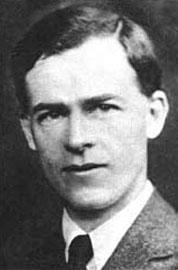
G D H Cole
Some contemporary Labour Party intellectuals stressed workplace democracy. This was a central theme in the “guild socialism” of G. D. H. Cole and others. Cole – another Fabian – is sometimes described as a ‘libertarian socialist’ and as an advocate of ‘decentralized’ socialism. But he supported the wholesale nationalisation of industry and the abolition of private enterprise.
Cole’s vision of socialism was of an integrated, national system where ‘a single authority is responsible both for the planning of the social production as a whole and for the distribution of the incomes which will be used in buying it.’ Within this ‘single authority’ he also sought devolved worker control. He wanted local autonomy of manufacturing, modelled on the medieval guild. But he was tragically unclear about how the two were to be reconciled.
These theorists ignored the problem of devolving genuine power within a national bureaucracy, without the creation of autonomous private enterprises. A major debate within the Labour Party concerned the desired structure and devolution of power within this national public framework.
Clause Four, Part Four of the Labour Party Constitution reflected a compromise between these different strands of thought. But all were united in their support of wholesale common ownership. Sidney Webb drafted these words and they were adopted by the Labour Party in 1918:
“To secure for the workers by hand or by brain the full fruits of their industry and the most equitable distribution thereof that may be possible upon the basis of the common ownership of the means of production, distribution and exchange, and the best obtainable system of popular administration and control of each industry or service.”
This provided for no exception: all production would be in common ownership and there would be no private sector. Although some Labour Party thinkers began to entertain the possibility of some private enterprise, resolute support for widespread common ownership prevailed.

Clement Attlee
In 1937, eight years before he became Prime Minister, Clement Attlee wrote of the ‘evils’ of capitalism: their ‘cause is the private ownership of the means of life; the remedy is public ownership.’
Attlee approvingly quoted the words of Bertrand Russell: ‘Socialism means the common ownership of land and capital together with a democratic form of government. … It involves the abolition of all unearned wealth and of all private control over the means of livelihood of the workers’.
After 1945, the position of many leading Labour Party members began to shift. First the realities of gaining and holding on to power – as a majority party for the first time – dramatized the political and practical unfeasibility of abolishing all private enterprise. Some nationalization was achieved, but a large private sector remained.
Second, with the outbreak of the Cold War in 1948 it was more difficult to sustain the naïve, rose-tinted views of the Soviet Union, although as Bill Jones shows in his book The Russia Complex, they were remarkably persistent.
In 1956 C. Anthony Crosland published The Future of Socialism. This underlined Labour’s slow reconciliation with markets, private enterprise and a mixed economy. In 1959 the (West) German Social Democratic Party abandoned the goal of widespread common ownership. In the same year, Hugh Gaitskell tried to get the British Labour Party to follow this lead, but met stiff resistance.
Because of Gaitskell’s failed attempt to change the wording of Clause Four, Corbyn’s mentor Tony Benn switched his allegiance to Harold Wilson. Wilson had been a student of Cole at Oxford University. When he was Prime Minister, Wilson pragmatically retained the clause but tolerated a mixed economy.

Tony Benn
In 1995, Tony Blair successfully ended the Labour Party’s longstanding constitutional commitment to far-reaching common ownership. But Benn still wished to retain the original wording and protested: ‘Labour’s heart is being cut out’.
In an interview in 2000, Benn favourably quoted Attlee: ‘If you look around the world, what are the problems? They’re all caused by the private ownership of the means of production, distribution, and exchange.’
It should be clear that Labour’s commitment to widespread common ownership was uppermost from 1900 to 1945. Subsequently Labour adjusted to the realities of a large-scale complex economy, where it is impossible to gather all information together in some central planning office, or even in some massive computer.
Democratic deliberation over every key decision is even more unfeasible. As Oscar Wilde quipped: socialism is impossible because it would take too many meetings.
In practice, if not in declaration, every leader of the Labour Party from 1955 to 2015 had abandoned the commitment to wholesale common ownership. But as Benn and Corbyn have illustrated so well, it has remained in Labour’s DNA.
A tricky gene transplant might have been possible, but only if Labour had developed a thoroughgoing alternative to its pre-1945 socialism. The closest it came to this was Crosland’s Future of Socialism, which commendably emphasized the goal of diminishing economic inequality, instead of common ownership.

Tony Blair
But largely the party fudged the issue, trying to turn the original meaning of socialism (which had prevailed from 1830 to 1950) into something else. Even Blair retained the word socialism in his rhetoric and in his redraft of Clause Four.
Blair promoted ‘social-ism’, which now meant recognizing individuals as socially interdependent. It also signalled social justice, cohesion, and the equal worth of each citizen, with equal opportunities.
Such a doctrine was indistinguishable from the earlier views of radical social liberals, such as T. H. Green and J. A. Hobson. It was a hundred miles away from the collectivism of Owen, Cole or the Webbs. But (with or without the hyphen) the word socialism was retained.
Blair favoured the tradition of ‘ethical socialism’ naming proponents such as John Macmurray and R. H. Tawney. But he wrongly stated that these socialists had been opposed to common ownership. On the contrary, their original devotion to this goal was no less than that of Owenism or Marxism, although Tawney and others later adjusted their views.
Instead of tackling the problem of its collectivist DNA more explicitly and resolutely, Labour tried to change the meaning of socialism and even rewrote parts of its own history. It is unsurprising that the old DNA survived.
Genetic Recombination with ‘Anti-Imperialism’
The late 1960s and early 1970s were years of great political convulsion. At the centre was opposition to the War in Vietnam. Previously most hard-left groups – including the forerunner of today’s Socialist Workers Party – were ‘entryists’ in the Labour Party. Before 1968 it was the only place to be. But the Vietnam War changed all that.
As British Prime Minister, Wilson declared government support for the military actions of the United States in Vietnam, but astutely avoided sending British troops. By 1968 the Labour Party conference had come out against the war. Wilson personally bore the brunt of the opposition. Thousands of activists left the Labour Party. Most of the hard-left sects followed them.
 From 1920 to 1968 the main socialist party outside Labour was the Communist Party of Great Britain. After 1968 they were competing in this narrow space with several feuding and splintering Trotskyist groups.
From 1920 to 1968 the main socialist party outside Labour was the Communist Party of Great Britain. After 1968 they were competing in this narrow space with several feuding and splintering Trotskyist groups.
It was Lenin, not Marx, who had made ‘anti-imperialism’ and national liberation a key motif of his Marxism. He was followed in this respect by Trotsky.
Hence Leninism once again became visible on the far left. But this time it did not necessarily mean loyalty to the Soviet Union: it mean ‘solidarity with anti-imperialist struggles’ in Cuba, Vietnam, Palestine and elsewhere.
Corbyn was 19 years old in 1968. Politically, these were his formative years. Unlike many others he remained in the Labour Party, partly attracted by the ideas and charisma of Benn, who narrowly lost the contest for deputy leadership against Dennis Healey in 1981. Corbyn’s unwavering views, his election as an MP in 1983 and his political survival until his triumphant bid for leadership in 2015, has spliced Leninist genes alongside those of the old Owenite collectivism.
Blair’s invasion of Iraq in 2003 and the financial crash of 2008 had helped to turn the Labour membership against Blairism, in all its forms and dilutions. As evidence of the Freudian defence mechanism of regression as a response to severe stress, Labour reverted to an earlier stage of development, adopting its infant profile of collectivism and state control.
Labour’s ‘Russia complex’ also re-emerged. We can find sympathy with a post-Soviet Russia, in disputes over the Ukraine and the expansion of NATO.
Labour’s Future?
Labour’s enduring successes in 1945-51, 1964-1970, 1974-1979 and 1997-2010 were great liberal reforms and extensions of social justice, from the National Health Service to the minimum wage. They did not bring a mythical socialist future any closer. Labour advanced despite, not because of, its original socialism.
Recent developments within the Labour Party – including the resurgence of its collectivist past – make a parliamentary majority in 2020 impossible, unless some unforeseen catastrophe hits the Conservative Party. A recent report from within the Labour Party states that unless radical action is taken, Labour’s electoral prospects ‘remain very poor’.
 Any way we look, the outlook is bleak. The election of Corbyn to Labour Party Leader shows that organizations have something similar to the enduring DNA of biological organisms. As business practitioners know well, changing organizational DNA is notoriously difficult.
Any way we look, the outlook is bleak. The election of Corbyn to Labour Party Leader shows that organizations have something similar to the enduring DNA of biological organisms. As business practitioners know well, changing organizational DNA is notoriously difficult.
Later posts on this New Politics blog will address this problem and try to formulate some solutions. But we should not underestimate the scale of the task ahead. One of the first jobs for the Left is to reconsider where it has come from, and what kind of future it wishes to build. Nothing should be taken for granted.
But this ‘DNA’ analysis shows that the status of the Labour Party in Britain as the leader of a renewed and viable Left is now in doubt.
23 May 2016
Bibliography
Attlee, Clement R. (1937) The Labour Party in Perspective (London: Gollancz).
Blair, Tony (1994) Socialism, Fabian Pamphlet 565 (London: Fabian Society).
Cole, George D. H. (1920) Guild Socialism Re-Stated (London: Parsons).
Crosland, C. Anthony R. (1956) The Future of Socialism (London: Jonathan Cape).
Hodgson, Geoffrey M. (1999) Economics and Utopia: Why the Learning Economy is not the End of History (London and New York: Routledge).
Jones, Bill (1977) The Russia Complex: The British Labour Party and the Soviet Union (Manchester: University of Manchester Press).
Marx, Karl (1973) The Revolutions of 1848: Political Writings – Volume 1 (Harmondsworth: Penguin).
Owen, Robert (1991) A New View of Society and Other Writings (Harmondsworth: Penguin).
Webb, Sidney J. and Webb, Beatrice (1920) A Constitution for the Socialist Commonwealth of Great Britain (London: Longmans Green).
Posted in Common ownership, Jeremy Corbyn, Labour Party, Nationalization, Politics, Robert Owen, Socialism, Tony Benn, Tony Blair



 Parliamentarians and Royalists warred throughout Britain until the defeat and execution of Charles I in 1649 and the installation of a republic under Oliver Cromwell.
Parliamentarians and Royalists warred throughout Britain until the defeat and execution of Charles I in 1649 and the installation of a republic under Oliver Cromwell. Participants in the earlier anti-enclosure uprising in the Midlands in 1607 had been called “levellers” because they levelled hedges and fences.
Participants in the earlier anti-enclosure uprising in the Midlands in 1607 had been called “levellers” because they levelled hedges and fences. Authority would be vested in the House of Commons rather than in the King or the House of Lords. Specified “native rights” were declared sacrosanct for all Englishmen: freedom of conscience, freedom of worship, freedom from impressment into the armed forces, and equality before the law.
Authority would be vested in the House of Commons rather than in the King or the House of Lords. Specified “native rights” were declared sacrosanct for all Englishmen: freedom of conscience, freedom of worship, freedom from impressment into the armed forces, and equality before the law.


 The 1/n problem
The 1/n problem
 An entertaining four-part television series set during the English Civil War entitled The Devil’s Whore (released in North America as The Devil’s Mistress) has Rainsborough speaking in favour of common ownership, without any objection from Lilburne.
An entertaining four-part television series set during the English Civil War entitled The Devil’s Whore (released in North America as The Devil’s Mistress) has Rainsborough speaking in favour of common ownership, without any objection from Lilburne.


 What does Loach’s invitation tell us about the state of the Labour Party today? We need to look at his political views. We need to understand the politics of a celebrity that Labour now chooses to put on public display.
What does Loach’s invitation tell us about the state of the Labour Party today? We need to look at his political views. We need to understand the politics of a celebrity that Labour now chooses to put on public display. Other projects by Loach are different in style. He was to direct Jim Allen’s controversial stage play, Perdition. Allen was a Trotskyist and a close friend of Loach, until his death in 1999. Presented as a courtroom drama, the play dealt with an allegation of collaboration between Hungarian Zionists and the Nazis during the Holocaust.
Other projects by Loach are different in style. He was to direct Jim Allen’s controversial stage play, Perdition. Allen was a Trotskyist and a close friend of Loach, until his death in 1999. Presented as a courtroom drama, the play dealt with an allegation of collaboration between Hungarian Zionists and the Nazis during the Holocaust.  A similar unrealism appears in The Wind That Shakes the Barley (2006). The script was written by Paul Laverty. The film is set in Ireland in the period 1919-1923. It depicts the struggle for independence and the subsequent civil war.
A similar unrealism appears in The Wind That Shakes the Barley (2006). The script was written by Paul Laverty. The film is set in Ireland in the period 1919-1923. It depicts the struggle for independence and the subsequent civil war. Left Unity put up ten candidates in the 2015 general election, to stand against prominent Labour figures including Andy Burnham and Harriet Harman. Left Unity also contested some local elections. There is an unintentional irony in the u-word in its name.
Left Unity put up ten candidates in the 2015 general election, to stand against prominent Labour figures including Andy Burnham and Harriet Harman. Left Unity also contested some local elections. There is an unintentional irony in the u-word in its name. Loach decisively rejected social democracy. Referring to Labour and other similar parties, he said that “they’re mainly social democrat parties that think you can manipulate the markets to the advantage of ordinary people”.
Loach decisively rejected social democracy. Referring to Labour and other similar parties, he said that “they’re mainly social democrat parties that think you can manipulate the markets to the advantage of ordinary people”. In my book Conceptualizing Capitalism I go further, to argue that the state is necessary to part-constitute the legal framework of a capitalist economy. Hence some state intervention in a market economy is unavoidable. Given this, the practical question for progressives is where and how it should intervene. The literature on varieties of capitalism shows that many different outcomes are possible within capitalism, and
In my book Conceptualizing Capitalism I go further, to argue that the state is necessary to part-constitute the legal framework of a capitalist economy. Hence some state intervention in a market economy is unavoidable. Given this, the practical question for progressives is where and how it should intervene. The literature on varieties of capitalism shows that many different outcomes are possible within capitalism, and  This book elaborates on some of the political issues raised in this blog:
This book elaborates on some of the political issues raised in this blog:

 I was at the LSE student occupation in 1967 and one of the Grosvenor Square demonstrations in 1968. In that year I copied Bertrand Russell and tore up my Labour Party membership card in protest against US aggression in Vietnam.
I was at the LSE student occupation in 1967 and one of the Grosvenor Square demonstrations in 1968. In that year I copied Bertrand Russell and tore up my Labour Party membership card in protest against US aggression in Vietnam.








 I am a radical liberal. I believe in social solidarity with the less-privileged, as well as in individual rights. As Charles Kennedy showed when he was leader, the Liberal Democrats can succeed when they take principled, radical positions on justice, equality and war.
I am a radical liberal. I believe in social solidarity with the less-privileged, as well as in individual rights. As Charles Kennedy showed when he was leader, the Liberal Democrats can succeed when they take principled, radical positions on justice, equality and war.


 Sometimes, as in his Critique of the Gotha Programme of 1875, Marx referred to the “lower” and “higher phases” of communism, instead of socialism.
Sometimes, as in his Critique of the Gotha Programme of 1875, Marx referred to the “lower” and “higher phases” of communism, instead of socialism. 






 With the Brexit vote in 2016, Britain has entered its most dangerous political crisis since the Second World War. The country is governed by an inept Conservative Party that is tearing up the UK constitution and concentrating unprecedented power in the hands of its duplicitous ministers.
With the Brexit vote in 2016, Britain has entered its most dangerous political crisis since the Second World War. The country is governed by an inept Conservative Party that is tearing up the UK constitution and concentrating unprecedented power in the hands of its duplicitous ministers.




 I had written a book entitled The Democratic Economy where I argued that socialists should support a permanent private sector in the economy. The book was published by Penguin in 1984. Another influential work at the time was Alec Nove’s Economics of Feasible Socialism, which also argued for a substantial role for markets.
I had written a book entitled The Democratic Economy where I argued that socialists should support a permanent private sector in the economy. The book was published by Penguin in 1984. Another influential work at the time was Alec Nove’s Economics of Feasible Socialism, which also argued for a substantial role for markets. There was a commitment to “political pluralism” and to “economic pluralism” involving “a variety of forms of common ownership … and the toleration of a small private sector including self-employed workers and other private firms.” The economy must be dominated by mechanisms of “democratic planning … but also accommodating a market mechanism in some areas.”
There was a commitment to “political pluralism” and to “economic pluralism” involving “a variety of forms of common ownership … and the toleration of a small private sector including self-employed workers and other private firms.” The economy must be dominated by mechanisms of “democratic planning … but also accommodating a market mechanism in some areas.”
 But while old ideas within Labour had survived, the structure of the party and its electoral base had changed enormously in the period from 1983 to 2015. Kinnock had relied on the moderating force of the trade unions, to fight the hard left and move the party toward electability. But by 2015 the unions had been gravely weakened and several had moved toward the hard left.
But while old ideas within Labour had survived, the structure of the party and its electoral base had changed enormously in the period from 1983 to 2015. Kinnock had relied on the moderating force of the trade unions, to fight the hard left and move the party toward electability. But by 2015 the unions had been gravely weakened and several had moved toward the hard left.
 Trotskyists are socialists who believe in the common ownership of the means of production. This goal was stated in Labour’s Clause Four from 1918 to 1995, so why shouldn’t Trotskyists be allowed to join Labour?
Trotskyists are socialists who believe in the common ownership of the means of production. This goal was stated in Labour’s Clause Four from 1918 to 1995, so why shouldn’t Trotskyists be allowed to join Labour? Marxists do not see the French Revolutionary principles of liberty, equality and fraternity as a potential achievement for all, but the rhetoric of the rising capitalist class in the class struggle against the old feudal order.
Marxists do not see the French Revolutionary principles of liberty, equality and fraternity as a potential achievement for all, but the rhetoric of the rising capitalist class in the class struggle against the old feudal order. Writing in 1918, Lenin described the desired ‘dictatorship of the proletariat’ as ‘rule based directly upon force and unrestricted by any laws. The revolutionary dictatorship of the proletariat is rule won and maintained by the use of violence by the proletariat against the bourgeoisie, rule that is unrestricted by any laws.’ Trotsky supported Lenin in this and most other respects.
Writing in 1918, Lenin described the desired ‘dictatorship of the proletariat’ as ‘rule based directly upon force and unrestricted by any laws. The revolutionary dictatorship of the proletariat is rule won and maintained by the use of violence by the proletariat against the bourgeoisie, rule that is unrestricted by any laws.’ Trotsky supported Lenin in this and most other respects. Throughout his life, Trotsky defended the decisions of the first four congresses of the Communist International, which took place when Lenin was alive and before Stalin seized power.
Throughout his life, Trotsky defended the decisions of the first four congresses of the Communist International, which took place when Lenin was alive and before Stalin seized power. First, by hanging on to the word ‘socialism’, after abandoning its original meaning, it is difficult to exclude those who are more genuinely socialist in the classical sense of common ownership. Labour’s obligatory (but now shallow) rhetoric of ‘socialism’ is a green light for socialist entryists of all kinds.
First, by hanging on to the word ‘socialism’, after abandoning its original meaning, it is difficult to exclude those who are more genuinely socialist in the classical sense of common ownership. Labour’s obligatory (but now shallow) rhetoric of ‘socialism’ is a green light for socialist entryists of all kinds. Of course, Labour in practice has put aside the notion that it is speaking for one section of society only. But its name remains a problem, both for broadening its appeal and for barring the more energetic and extreme exponents of working class representation and power.
Of course, Labour in practice has put aside the notion that it is speaking for one section of society only. But its name remains a problem, both for broadening its appeal and for barring the more energetic and extreme exponents of working class representation and power.

 Here is my own confession: fifty years ago I believed that socialism was ‘obvious’. Eventually I was persuaded otherwise. Initially, it was not my growing awareness of the horrendous consequences of the socialist experiments in Russia, China and elsewhere that jolted me.
Here is my own confession: fifty years ago I believed that socialism was ‘obvious’. Eventually I was persuaded otherwise. Initially, it was not my growing awareness of the horrendous consequences of the socialist experiments in Russia, China and elsewhere that jolted me. Nobel Laureate Elinor Ostrom studied the management of common-pool resources – such as medieval common land, fisheries or agricultural irrigation schemes – and showed how they can be effectively managed by relatively small local communities.
Nobel Laureate Elinor Ostrom studied the management of common-pool resources – such as medieval common land, fisheries or agricultural irrigation schemes – and showed how they can be effectively managed by relatively small local communities.
 Corbyn is right:
Corbyn is right:  There is a need for rules, monitoring and countervailing power. If all economic power is concentrated in the bureaucracy of planners, then will be no effective alternative power that can countervail.
There is a need for rules, monitoring and countervailing power. If all economic power is concentrated in the bureaucracy of planners, then will be no effective alternative power that can countervail. The great American politician Robert F. Kennedy once said:
The great American politician Robert F. Kennedy once said: Even small successes –
Even small successes – 

 For example, Blair’s emphasis on ‘values and beliefs’ over institutional structures allowed him to privatize some public services, including parts of the National Health Service. His claim was that the same esteemed values could endure within any system of ownership. But changes to institutional structures affect the habits and beliefs of those involved. Extending the scope for contracts and markets means – rightly or wrongly – that pecuniary and profit-orientated values can become more pervasive, unless checks are put in place.
For example, Blair’s emphasis on ‘values and beliefs’ over institutional structures allowed him to privatize some public services, including parts of the National Health Service. His claim was that the same esteemed values could endure within any system of ownership. But changes to institutional structures affect the habits and beliefs of those involved. Extending the scope for contracts and markets means – rightly or wrongly – that pecuniary and profit-orientated values can become more pervasive, unless checks are put in place. David Bell – the then Chief Inspector of Schools – warned in a January 2005 speech to the Hansard Society that
David Bell – the then Chief Inspector of Schools – warned in a January 2005 speech to the Hansard Society that  Blair’s motivation for his decision to support Bush’s invasion will be the subject of many biographies and histories to come. The explanation is bound to be complex, but I guess that Blair’s supreme emphasis on ‘values’ over legalities, structures, evidence, fallibilities and practicalities will be uppermost. How else could someone believe in the possibility that Western democratic ideals could quickly take hold in an artificially-created country with no democratic history, riven by ethnic and religious division and fragmented into countless clans?
Blair’s motivation for his decision to support Bush’s invasion will be the subject of many biographies and histories to come. The explanation is bound to be complex, but I guess that Blair’s supreme emphasis on ‘values’ over legalities, structures, evidence, fallibilities and practicalities will be uppermost. How else could someone believe in the possibility that Western democratic ideals could quickly take hold in an artificially-created country with no democratic history, riven by ethnic and religious division and fragmented into countless clans? In September 2015 a rank outsider, with minimal support from inside the Parliamentary Party, became Labour Party Leader. But he was elected with the support of almost 60% of the party membership.
In September 2015 a rank outsider, with minimal support from inside the Parliamentary Party, became Labour Party Leader. But he was elected with the support of almost 60% of the party membership.

 From 1920 to 1968 the main socialist party outside Labour was the Communist Party of Great Britain. After 1968 they were competing in this narrow space with several feuding and splintering Trotskyist groups.
From 1920 to 1968 the main socialist party outside Labour was the Communist Party of Great Britain. After 1968 they were competing in this narrow space with several feuding and splintering Trotskyist groups. Any way we look, the outlook is bleak. The election of Corbyn to Labour Party Leader shows that organizations have something similar to the enduring DNA of biological organisms. As business practitioners know well, changing organizational DNA is notoriously difficult.
Any way we look, the outlook is bleak. The election of Corbyn to Labour Party Leader shows that organizations have something similar to the enduring DNA of biological organisms. As business practitioners know well, changing organizational DNA is notoriously difficult.